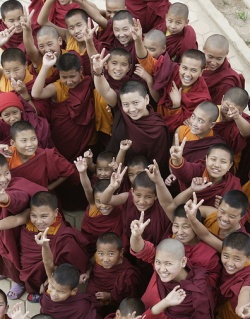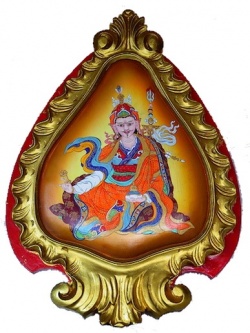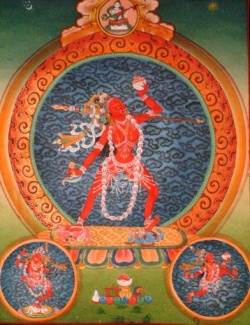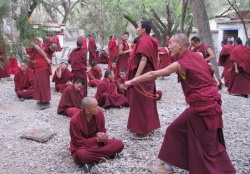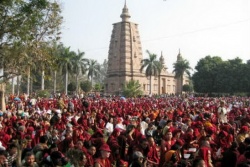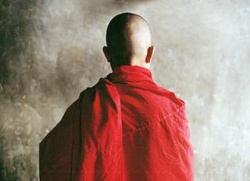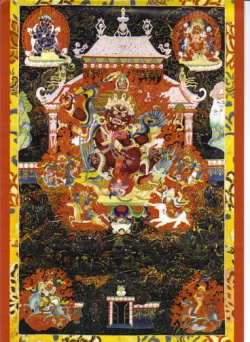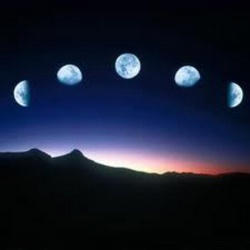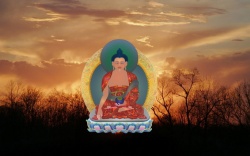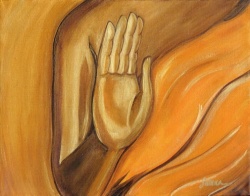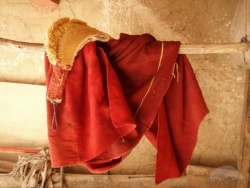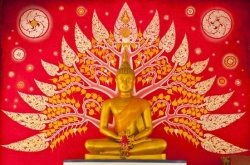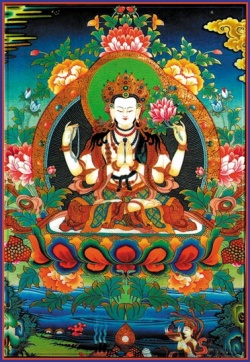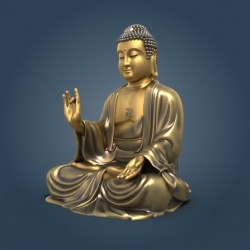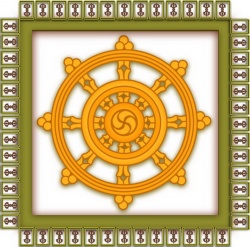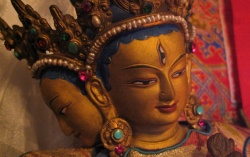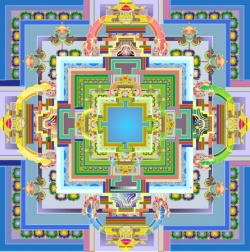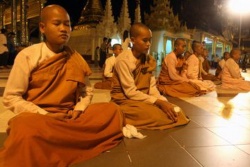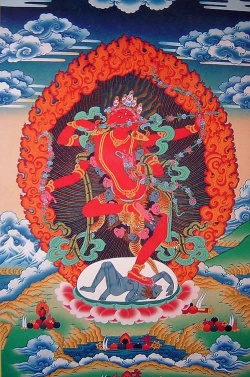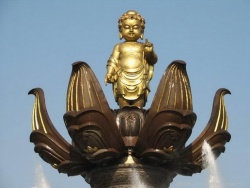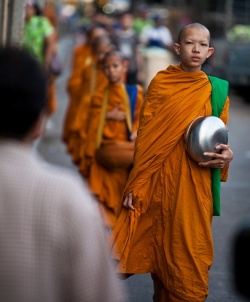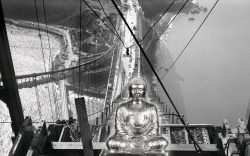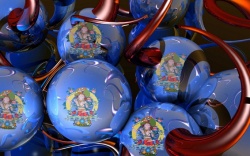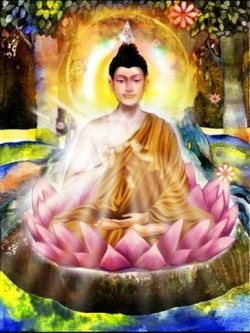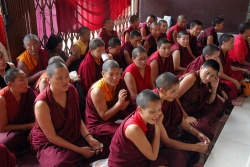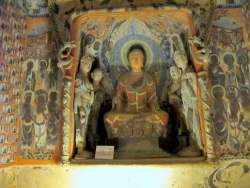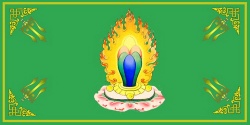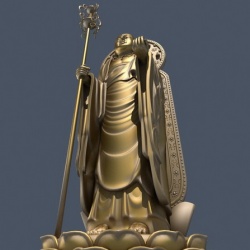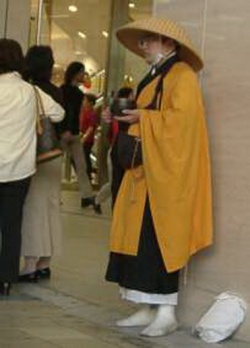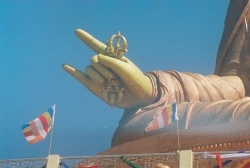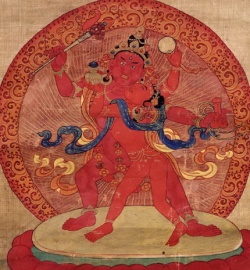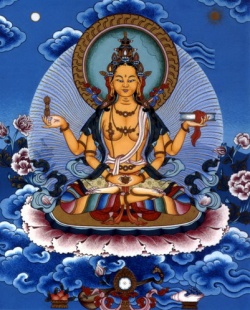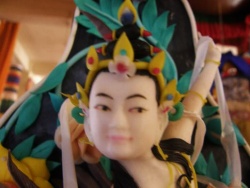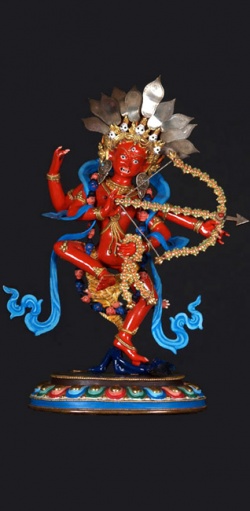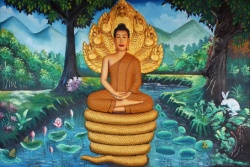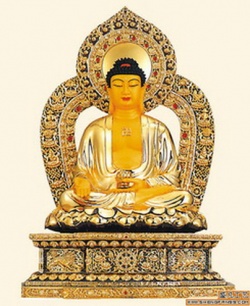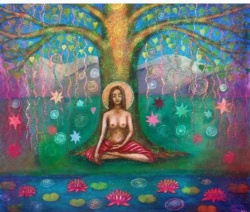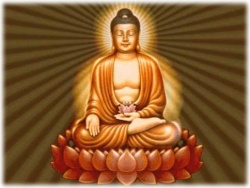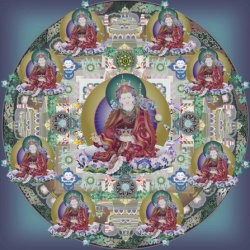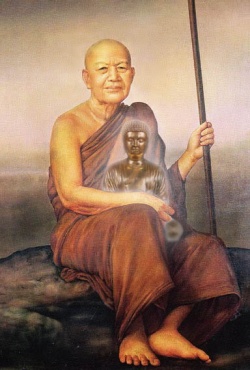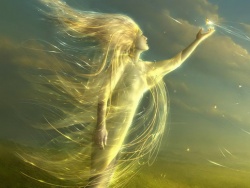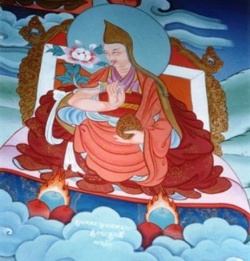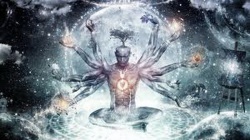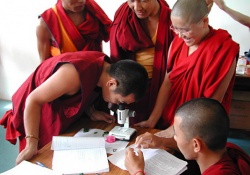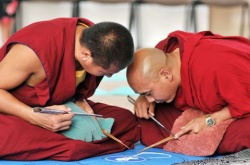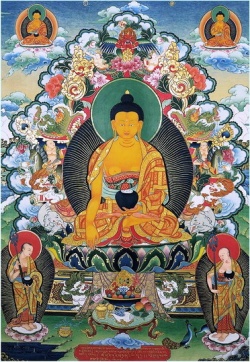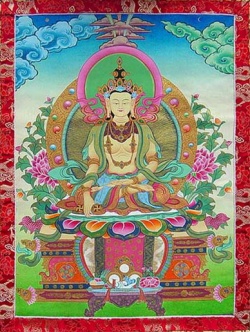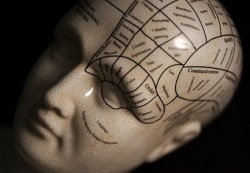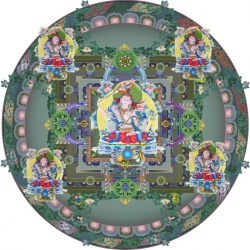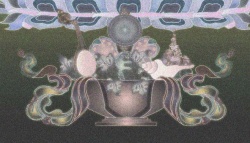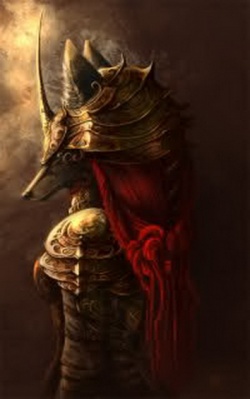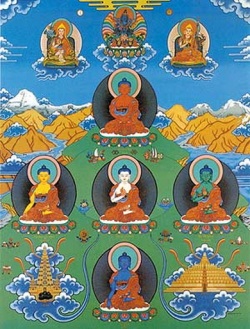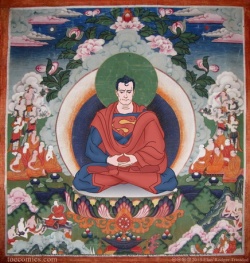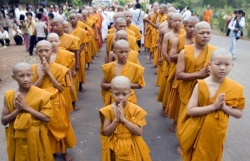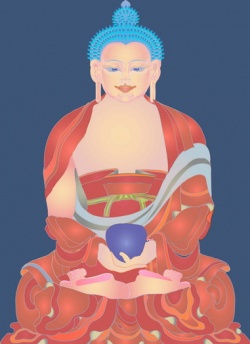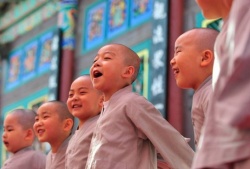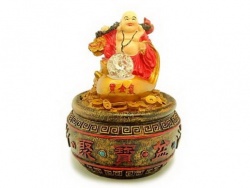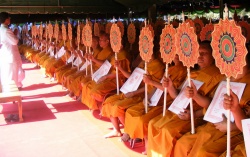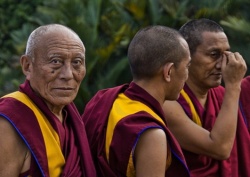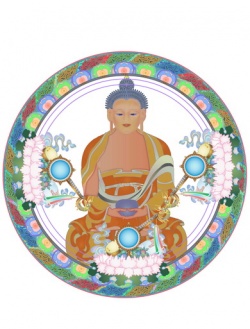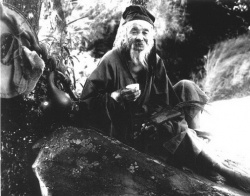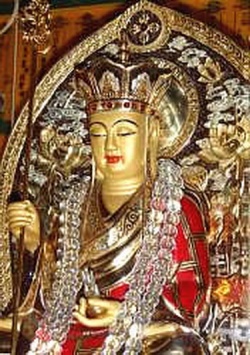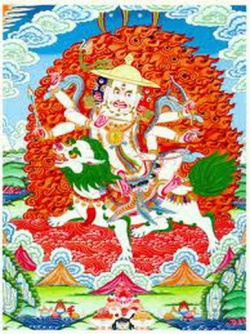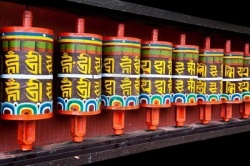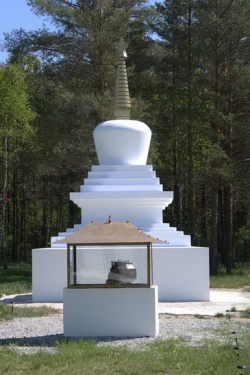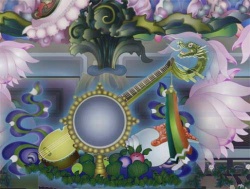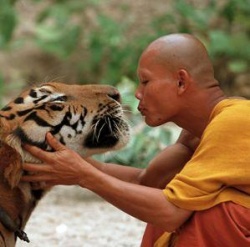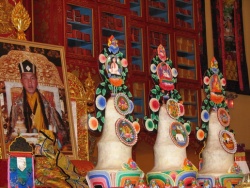The Wonderful Dharma Lotus Flower Sutra with commentary by the Venerable Master Hsuan Hua: Chapter 19: The Merit and Virtue of a Dharma Master
The Wonderful Dharma Lotus Flower Sutra
with commentary by the Venerable Master Hsuan Hua
Chapter 19: The Merit and Virtue of a Dharma Master
This is the nineteenth of the twenty-eight chapters of the Wonderful Dharma Lotus Flower Sutra. The previous chapter talked about the merit and virtue of rejoicing in accord with the Sutra. In this chapter we hear about a Dharma Master who explains and lectures on the Dharma Flower Sutra, who writes it out, receives and upholds it, reads or recites it aloud. The Merit and Virtue derived from these acts is greater than that of one who newly rejoices along in accord.
What is a Dharma Master? "Dharma" refers to the Buddhadharma. We take the Buddhadharma as our "Master." A Dharma Master takes the Buddhadharma as his guide. A Dharma Master also gives the Buddhadharma to living beings.
There are Five Types of Dharma Masters:
1. Dharma Masters Who Receive and Uphold the Sutras. They conduct themselves in accord with the meaning of the Sutras. They receive them with their minds and practice them with their bodies.
2. Dharma Masters Who Lecture the Sutras. They expound on the texts and speak the Buddhadharma.
3. Dharma Masters Who Read the Sutras.
4. Dharma Masters Who Recite the Sutras from Memory. They can do it without the text.
5. Dharma Masters Who Write Out the Sutras. After they write them out they may place them in a jeweled stupa, or print them and circulate them throughout the world. When the Sutras are placed in the stupa, people can come, bow and make offerings to them. The merit and virtue obtained by writing out the Sutras is inconceivable. If you can write out the Sutras and circulate them in the world, your merit and virtue will abide forever.
Sutra:
At that time the Buddha told the Bodhisattva, Mahasattva, Ever-Vigorous, “If a good man or a good woman receives and upholds the Dharma Flower Sutra, whether reading it, reciting it, explaining it to others or writing it out, that person will obtain eight hundred meritorious virtues of the eyes, twelve hundred meritorious virtues of the ears, eight hundred meritorious virtues of the nose, twelve hundred meritorious virtues of the tongue, eight hundred meritorious virtues of the body, and twelve hundred meritorious virtues of the mind. By means of these meritorious virtues, he adorns his six faculties, causing them all to become pure.”
Outline:
D2. Explaining the first kind of merit and virtue as an exhortation to propagation.
E1. General listing of merits.
Commentary:
At that time the Buddha told the Bodhisattva, Mahasattva, Ever-Vigorous something more about merit and virtue. When he had finished chapter eighteen, he went on to chapter nineteen, which discusses the merit and virtue of a Dharma Master.
If a good man or a good woman, one who has taken the Five Precepts and practices the Ten Good Deeds, receives and upholds the Dharma Flower Sutra, whether reading it, reciting it from memory, explaining it to others, or writing it out, that person will obtain eight hundred meritorious virtues of the eyes.
Basically, each of the six sense organs has a potential of twelve hundred meritorious virtues. They divide into the three periods of time—past, present, and future—and the four directions of north, east, south and west. In the front there are three hundred meritorious virtues; in the back there are three hundred meritorious virtues; on the left there are three hundred meritorious virtues; and on the right there are three hundred meritorious virtues. That makes twelve hundred meritorious virtues. Now why do we say that the eyes have only eight hundred meritorious virtues? Because our range of vision is limited. If we look straight ahead, we cannot see behind at the same time. While we are looking to our left, we cannot see what is to our right.
I do not believe that. You tell us that if one opens the Five Eyes, one can see in front and behind at the same time," you protest.
Yes, but that is a functioning of the Five Eyes. Here we are talking about our ordinary eyes, not the Five Eyes.
Although the eyes have a potential of twelve hundred meritorious virtues, they do not function at full capacity but are limited to only eight hundred:
250 to the right
250 to the left
300 to the front
making only eight hundred meritorious virtues for the eye.
Twelve hundred meritorious virtues of the ears. Whether the sound is coming from above or below, right or left, the ears can still hear it. They can hear from any direction, and so they are perfect and unobstructed and are given twelve hundred meritorious virtues.
There are eight hundred meritorious virtues of the nose. The nose has 400 meritorious virtues when breathing in, and 400 meritorious virtues when breathing out, which gives it 800 meritorious virtues. But in between breathing in and out, the nose does not smell and so it is deficient by 400 meritorious virtues. The nose is not a "perfect organ."
There are twelve hundred meritorious virtues of the tongue. No matter what comes in contact with the tongue, the tongue can taste it. Therefore, the tongue has twelve hundred merits.
There are eight hundred meritorious virtues of the body. The body feels touch. It has two conditions:
1. according, which refers to pleasurable contact.
2. opposing, which refers to unpleasurable contact.
Pleasurable touch carries 400 meritorious virtues, and unpleasurable touch carries 400 meritorious virtues. They add up to eight hundred meritorious virtues possessed by the body. Since touch does not take place when there is separation, the body id deficient by 400 meritorious virtues.
And there are twelve hundred meritorious virtues of the mind. We are talking about the sixth (mind) consciousness, not the eighth consciousness. The thoughts of the mind take place regardless of conditions, so it is very perfect and gets twelve hundred points.
The person who receives, upholds, reads, recites, writes out and explains the Dharma Flower Sutra derives six thousand meritorious virtues from the six sense organs.
By means of these meritorious virtues, he adorns his six faculties, causing them all to become pure. By means of these six thousand meritorious virtues, his eyes, ears, nose, tongue, body and mind become clear and pure.
Sutra:
“This good man or woman, thus purifying the ordinary physical eyes that he or she was endowed with at birth, will see throughout the three thousand great thousand world system, inside and out, all the mountains, forests, rivers and seas, below to the Avici hells, and above to the Peak of Existence. Such a person will also see all the living beings therein, as well as their karmic causes and conditions, rewards and retributions, and places of birth. All of those he will see and know.”
At that time the World Honored One, wishing to restate this meaning spoke verses, saying,
“If, within the great assembly,
One speaks this Dharma Flower Sutra,
With a heart free of fear,
Listen to me tell of his merit and virtue:
This person will gain eight hundred
Supreme meritorious virtues of the eyes,
And because of this adornment,
His eyes shall be very clear and pure.
With the eyes given him from birth,
He will see throughout the three thousand
Great thousand world system,
Inside and out, Mount Meru,
Sumeru, and the Iron Ring Range,
As well as the other mountains and forests,
The waters of the great seas, rivers, and streams,
Below to the Avici hell,
Above to the Peak of Existence,
And all the living beings within--
All of this he will completely see.
Although he has not yet gained the Heavenly Eye,
His flesh eyes will have powers such as these.”
Outline:
E2. Specific explanation of the merits and virtues.
F1. The eyes.
Commentary:
This good man or good woman thus purifying the ordinary physical eyes which he or she was endowed with at birth, will see throughout the three thousand great thousand world system, inside and out, all the mountains, forests, rivers, and seas.
The “ordinary physical eyes” are not the Five Eyes. A verse about the Five Eyes says:
The heavenly eye penetrates what is without obstruction;
The flesh-eye sees obstacles and does not penetrate.
The Dharma-eye can contemplate only the relative truth;
The wisdom-eye can contemplate and know true emptiness,
While the Buddha-eye blazes forth like a thousand suns.
Although the Five Eyes’ functions differ, their substance is of one source.
"Mountains" can refer to our bodies. "Forests" can refer to the hairs on our bodies. Our blood veins are the "rivers," and our inner organs are the "seas." A person who gains six thousand meritorious virtues to adorn his sense organs can, with his flesh eyes, see the three thousand great thousand world system. Arhats who have attained the Fourth Fruition can see the three thousand great thousand world system. First Ground Bodhisattvas can see one hundred Buddhalands. Bodhisattvas on the Second Ground can see twice as many Buddhalands. Sages have varying ranges of vision.
This person can see below to the Avici hells. "Avici" is Sanskrit and means "unspaced." This hell is a place of uninterrupted punishment. The Earth Store Sutra lists the five reasons why the hell is called Avici—“unspaced”. You can read about it in detail here.
This person can see above to the Peak of Existence--the Heaven of Neither Perception Nor Non-Perception, which is the highest point in the three realms. Such a person will also see all the living beings therein, as well as their karmic causes and conditions, rewards and retributions, and places of birth. He will see what delusions they give rise to, what karma they create, and what retribution they must undergo. All of those he will see and know completely.
At that time the World Honored One, wishing to restate this meaning spoke verses, saying:
If, within the great assembly, one speaks this Dharma Flower Sutra, with a heart free of fear, listen to me tell of his merit and virtue: In this chapter concerning the merits and virtues of a Dharma Master, Shakyamuni Buddha talks about speaking Dharma in a large assembly. That is not particularly easy, because a great assembly has a kind of awesomeness about it. Unless you have a fearless heart, you will be frightened and unable to speak Dharma. To be able to lecture on the Buddhadharma in front of a lot of people is no simple matter. But the person described here uses a heart that is free of fear because of the merit and virtue he has gained from listening to and lecturing on the Dharma Flower Sutra. If you are afraid, you would not be able to lecture on the Dharma properly. A Dharma Master like this, however, has no fear of the great assembly. He expounds on the Dharma Flower Sutra, explaining it so that everyone can understand it.
This person will gain eight hundred supreme meritorious virtues of the eyes. The eyes have only eight hundred meritorious virtues, because one's range of vision is limited. There are 250 meritorious virtues to the left, 250 meritorious virtues to the right, and 300 in front, making eight hundred in all. A Dharma Master who explains the Dharma Flower Sutra obtains these supreme and meritorious virtues of the eyes.
We all have eyes, but ordinary people's eyes have no merit and virtue. They just see things on the physical and material plane. But the merit and virtue of this person's eyes enable him to see throughout the three thousand great thousand world system--everything inside and outside. He does not need to gain the Heavenly Eye to see these things, either.
And because of this adornment, his eyes will be very clear and pure. The eyes he was born with will become clear and pure. With the eyes given him from birth, he will see throughout the three thousand great thousand world system. This is an inconceivable state. He will see the living beings both inside and out, as well as Mount Meru—“Meru” is a Sanskrit word which means “light”—Sumeru, and the Iron Ring Range. Sumeru means “wonderfully high.” Mount Sumeru is at the center of the world, and the Iron Ring Mountains are just beyond the fragrant seas. He will see these as well as the other mountains and forests, the waters of the great seas, rivers, and streams; below to the Avici hell; above to the peak of existence. "Avici" means "unspaced." In this hell, if there are many people, it is full; if there is just one person, it is still full. One person fills it; a thousand people also fill it. Ten thousand people also can fit in this hell and make it just as full as one person would. It is called "unspaced" because there is no space there. What kind of people fall into the Avici hell? Those who commit the Five Rebellious Acts:
1. Killing one's father.
2. Killing one's mother.
3. Killing an Arhat.
4. Shedding a Buddha's blood.
5. Breaking up the harmonious Sangha.
"Breaking up the harmonious Sangha" occurs when one goes into a Sangha dwelling where everyone is basically getting along very well, and proceeds to indulge in a lot of gossip and get everybody upset. "Shedding a Buddha's blood" also includes damaging or destroying Buddha images. If a Buddha is in the world and you injure him and shed his blood, you fall into the Avici hell. If a Buddha has entered Nirvana, the offense is the same if you break or damage a Buddha image.
If you fall into the Avici hell, and try to get out, you won't be able to. There is no way out. It is not known when you will ever escape. A Bodhisattva or a Buddha might emit light to shine on you and you will be able to get out. But such things happen only very rarely.
The " Peak of Existence" is the Heaven of Neither Perception Nor Non-Perception--the highest place in the three realms. An astronomer cannot even think of a place like this, let alone get there. No matter how far advanced science gets, it is not going to get there! However, one who lectures on the Dharma Flower Sutra can see this place, the highest of the heavens.
And he will see all the living beings within—from the pits of hell to the highest of the heavens. All of this he will completely see. Although he has not yet gained the Heavenly Eye, his flesh eyes will have powers such as these. His ordinary physical eyes will have that much merit and virtue.
Sutra:
“Furthermore, Ever-Vigorous, if a good man or a good woman receives and upholds this Sutra, whether reading it, reciting it, explaining it to others, or writing it out, that person will obtain twelve hundred meritorious virtues of the ears.
With his pure ears he will hear throughout the three thousand great thousand world system, inside and out, below to the Avici hell and above to the Peak of Existence, all the various sounds and voices, such as sounds of elephants, horses, cows, and carriages; sounds of sobbing and sighing; sounds of conches, drums, gongs, and bells; sounds of laughter and talking; sounds of men, women, boys, and girls; sounds of Dharma and non‑Dharma; sounds of suffering and joy; sounds of common people and sages; sounds of happiness and unhappiness; sounds of gods, dragons, yakshas, gandharvas, asuras, garudas, kinnaras, and mahoragas; sounds of fire, water, wind; sounds of hell-beings, animals and hungry ghosts; sounds of Bhikshus and Bhikshunis; sounds of Hearers, Pratyekabuddhas, Bodhisattvas, and Buddhas. In general, although he has not yet obtained the Heavenly Ear, by using the pure ordinary ears given to him at birth, he can hear and know whatever sounds there may be inside and outside the three thousand great thousand world system. In this way he distinguishes between all the various sounds, and still his hearing is not impaired.”
Commentary:
Furthermore, Ever-Vigorous, if a good man or a good woman who keeps the Five Precepts and cultivates the Ten Good Deeds, or a Bhikshu or Bhikshuni who has taken the Complete Precepts, or a Bodhisattva who has taken the Bodhisattva Precepts, or a Shramanera who has taken the Shramanera Precepts, receives in the mind and upholds with the body this Sutra, whether reading it, reciting it from memory, explaining it to others, or writing it out, that person will obtain twelve hundred meritorious virtues of the ears.
The ear is complete in its meritorious virtues because it can hear sounds from all directions. With his pure ears, that is, the ones he was born with, he will hear throughout the three thousand great thousand world system, inside and out, below to the Avici hell and above to the Peak of Existence, all the various sounds and voices, such as sounds of elephants, horses, and cows. Hearing your sound he will know if you were an elephant in your last life, or if you are going to be an elephant in your next life; whether you were a horse in your last life or whether you are going to be a horse in your next life. Simply by hearing your sound, he knows your former causes and latter effects. He can know, "Oh, originally that person was an ox in his last life, and so now his sound still has that bovine touch to it." Or he can tell, "Oh, no, that person sounds like he is on his way to being an ox in his next life." He does not even have to see the person. He can just listen with his eyes closed to the sound of the voice and know what a person is going to be in the future. He can also pick out the various sounds in one single voice: "Oh that voice contains human sounds, and horse sounds, ox sounds, pigeon sounds--all kinds of sounds rolled into one!"
He will hear the sounds of carriages and sounds of sobbing and sighing. Some people's voices sound very whiny, as if they are going to cry. There is no resonance to them. Some people sound as if they are sighing and whimpering every time they say something. This Dharma Master will know why they sound so miserable, too. He will know that they sound so miserable because in the future they are due for such and such an accident. Perhaps, they are soon to die in an automobile accident. Or perhaps at present they have some problem they cannot solve.
He hears the sounds of conches, drums, gongs, and bells. He hears the sounds of laughter and talking, sounds of men, women, boys, and girls. "Oh, that is a man talking, but in the future he is going to be a woman." Or perhaps someone was a man in a former life and is now a woman. Everyone sounds different when talking. There are sounds of Dharma and non-Dharma. "They are just rapping confusedly. Do not listen!" There are sounds of suffering and happiness, sounds of common people and sages. Just by hearing your voice, he can know you are a common person who has not been certified to the fruit; or "Ah! That person is a sage." So you cannot fool this Dharma Master.
Sounds of happiness and unhappiness--all these he knows, and so the ears have twelve hundred merits.
He will hear the sounds of gods who inhabit the heavens of desire, form, and formless realms.
How does one get born in the heavens? By keeping the Five Precepts and cultivating the Ten Good Deeds, one will receive the blessings of the heavens. Just by hearing a person talk, the Dharma Master can tell, "Oh, that person is going to be born in the heavens in the future." Or he can tell, "That person came from heaven. It is a god who has become a human being."
He will hear the sounds of dragons. Hearing the sound, he is able to know what the dragon did in the past that caused him to fall into the body of a dragon. Or he can tell that a person is going to turn into a dragon in the future. He knows if one was a dragon in the past, is one now, or will be one in the future. Just hearing the sound, he can tell the former causes and latter effects.
He will hear the sounds of yakshas. Yakshas are "speedy" ghosts. There are earth-bound yakshas who can travel on the ground, and there are space-travelling yakshas that can fly. They travel very fast.
He will hear the sounds of gandharvas. He knows their past, present and future. Perhaps this was a person before, and now he has turned into a gandharva. Or maybe he is a person now, but will be a gandharva in the future. Hearing his sound, the Dharma Master will know his past causes and present effects, and his future effects, too.
"Gandharva" is also Sanskrit and means "incense inhaling spirits." They love to smell incense. The Jade Emperor has a certain kind of chandana incense, and when he lights some, the gandharvas all show up to make music in his court. They also dance.
This Dharma Master will also hear the sounds of asuras. "Asura" is also Sanskrit. It means "ugly." They are extremely ugly. They have the blessings of the gods but not the virtue of the gods. They are very feisty and love to fight. Just on hearing these sounds, the Dharma Master is able to know their past, present, and future retributions.
He will hear the sounds of garudas. The garudas are great golden-winged peng birds. They eat dragons in the same way that we eat noodles. Dragons are pretty large. They are one of the largest varieties in the class of worms. Birds all eat worms, you know. Small birds eat small worms, and big birds eat big worms. The wing-spread of this bird is 360 yojanas. With one flap of his wings, he can dry up the waters of the sea for a radius of 360 yojanas. That leaves all the dragons exposed--perfect garuda meals! The garuda prefers the tender young dragons, and besides the older dragons tend to be better at concealing themselves. Seeing all their young being devoured, the older dragons decided it was time to start a "save the dragons" movement, but they could not think of what to do. They thought, "Shakyamuni Buddha is greatly compassionate. Let us go ask him to help us."
"Buddha," they said, "the golden-winged peng bird has been indiscriminately slaughtering our young for food. Our dragon-race is about to become extinct. Please be compassionate and save us."
Shakyamuni Buddha said, "Here, give each of the dragons one thread from my robe, and you will be okay."
The next time the garuda bird flapped the sea dry, there were no dragons to be seen. The sea was dried up, but all the bird could see was little threads. The garuda had a bit of spiritual powers himself. He knew that the Buddha must have helped the dragons. He went to the Buddha and said, "Shakyamuni Buddha, you are being very compassionate to the dragons, but you are not being compassionate towards the great golden-winged peng birds. If we do not eat dragons, we are going to starve. We eat a lot, and only dragons are big enough to provide us with sufficient nourishment. You are not being impartial and fair about this."
The Buddha said, "In my Dharma, we liberate life and stop killing. Eating dragons is a form a killing. You kill dragons now, and in your next life they kill you. Things just get worse and worse. You should quit eating dragons. You should be vegetarians. Do not eat meat anymore."
"Where am I going to get vegetables?" asked the bird. "After this," said the Buddha, "whenever my disciples eat lunch, they will make an offering of food to you, so you do not have to eat dragons anymore." And so the garuda and the Buddha signed that agreement. The dragons could live without fear of being eaten, and garudas did not starve to death. Even up to the present when we eat lunch we send out some food for the garudas. If you have opened the Five Eyes, when you send the food out you will see the great golden-winged peng birds come and eat it. Wherever they go, when Buddhist disciples eat lunch, they should send out a portion to the garudas.
Kinnaras are one of the eight-fold divisions. Translated from Sanskrit, "kinnara" means "doubtful spirit." They are also musicians in the Jade Emperor's court. When the gods have parties, they call in the kinnaras who make extremely fine music.
And mahoragas are big snakes, pythons, one of the eight-fold divisions. The Dharma Master who lectures the Dharma Flower Sutra can know all the sounds of the eight-fold divisions.
Sounds of fire, water, and wind. This means he knows the sounds of past, present, and future fires. He knows of the sounds of the three periods of time. He knows that a certain place was, is, or will be flooded. He can know the sounds of hurricanes of the past, present, and future. "Ah! A hurricane is approaching from ten thousand miles away." He knows why the wind is blowing and when it will blow in the future.
Sounds of hell-beings. Just on hearing a person's voice he can tell, "That person is going to fall into the hells," or "that person just came out from the hells." He can also hear the sounds of the hells at the present period of time.
Animals. Hearing a person's voice he can tell, "That person was an animal," or "That person will be an animal in the future." He can hear an animal's sound and know, "That one is going to continue being an animal."
And hungry ghosts have a hard time finding food. Sometimes for great eons they cannot find a drop of water, blood, or wine to drink. They are always starving, and it is really painful. You should not think about eating all the time; otherwise, you might turn into a hungry ghost. You should look upon food as medicine. Do not get carried away with how tasty or how nutritious it is. It is medicine, because if we did not eat, we would die. So we should think, "I take this food only as medicine, to cure this decaying body." This is one of the Five Contemplations one makes when one eats:
1. Consider the amount of work involved in bringing the food to the table.
2. Reflect on whether or not your virtuous conduct is sufficient to entitle you to receive the offering.
3. Guard against mental transgressions, principally that of greed.
4. Regard the food as medicine to prevent the body from collapsing.
5. Take this food only in order to accomplish your work of the Way.
If you hold these Five Contemplations while you eat, you will digest your food very well. If you do not, then, as the saying goes, "If the three minds are not ended, it is hard to digest water." If you have not ended the thoughts of the past, present, and future, you will have a hard time digesting even an offering of a cup of water. On the other hand, "If the Five Contemplations are understood, you can digest gold." So when left-home people eat, they recite the Offering Mantra and then hold the Five Contemplations. They do not indulge in polluted thinking, but instead "respond to offerings," as they eat.
Sounds of Bhikshus. He knows who was a Bhikshu in a previous life, who is about to become a Bhikshu in the present life, and who will become a Bhikshu in the future life, just by hearing his voice.
one of the largest varieties Perhaps she was a Bhikshuni in the past and is not one now, or is one now and will be one in the future.
Sounds of Hearers. Hearers awaken to the Way when they hear the Four Noble Truths: suffering, origination, extinction, and the Way.
Pratyekabuddhas awaken through cultivation of the Twelve Causes and Conditions.
This Dharma Master knows who was a Bodhisattva in the past but is now an ordinary person, who will be a Bodhisattva in the future, and who is now a Bodhisattva.
And Buddhas. Hearing a voice he knows, "That is the Buddha sound."
In general, although he has not yet obtained the Heavenly Ear, by using the pure ordinary ears given to him at birth, he can hear and know whatever sounds there may be inside and outside the three thousand great thousand world system. In this way he distinguishes between all the various sounds, and still his hearing is not impaired. Even though he hears all these sounds, he is not turned, defiled, or influenced by the sounds. Because he is not attached to them, his faculty of hearing is not damaged. If he were to get attached to them, his hearing would be harmed.
At that time the World Honored One, wishing to restate this meaning, spoke verses saying,
“The ears he was born with
Are pure and without filth.
With his ordinary ears he hears
Sounds of the three thousand great thousand world system:
Sounds of elephants, horses, carriages and cows;
Gongs, bells, conches and drums;
Sounds of lutes and harps;
Sounds of pipes and flutes; and
Sounds of clear, fine chants.
He hears these, but is not attached to them.
Hearing the sounds of countless kinds of people,
He can understand them all.
He also hears the sounds of the gods--
Their subtle, elegant voices raised in song.
He also hears the sounds of men and women,
The sounds of young boys and girls,
As well as the kalavinka sound
Coming from the mountains, streams, and deep ravines.
He hears all the sounds
Of the jiva-jivaka and other birds,
The bedlam of misery and pain in the hells--
The sounds of all the torture there.
He hears the sounds of hungry ghosts,
driven by hunger and thirst,
As they seek for food and drink, and
The mighty roar put forth
By all of the asuras
As they dwell beside the sea
Bickering among themselves.
In this way, one who speaks the Dharma
Can dwell securely there and hear
The faraway multitude of sounds,
And yet there is no harm to his hearing.
Throughout all the ten directions,
Birds and beasts cry out to one another.
The one who speaks the Dharma
Can hear them one and all.
As for the sounds and speech of the Brahma gods,
The Light Sound gods and those of Pervasive Purity,
Up to the Heaven of the Peak of Existence,
The Dharma Master here in the world
Can hear them one and all.
The entire assembly of Bhikshus
And Bhikshunis,
Whether reading or reciting Sutras,
Or speaking them for others,
The Dharma Master dwelling here
Can hear them one and all.
Further, all the Bodhisattvas
Reading or reciting this Sutra-Dharma,
Or speaking it for others,
Or compiling commentaries on its meaning,
All such sounds as these,
He hears in detail.
All the Buddhas, great sagely honored ones,
Teaching and transforming living beings
In the midst of the great assemblies,
Expounding upon the subtle, wondrous Dharma,
Can be heard by one who holds the Dharma Flower.
All the sounds inside and out
Of the three thousand great thousand world system,
Below to the Avici hell,
And above to the Heaven of the Peak of Existence
Can each and every one be heard
And still his hearing is not harmed.
Since his ears are keen and sharp,
He can discern them all.
The one who upholds the Dharma Flower,
Although he has not yet gained the Heavenly Ear,
Merely using the ears he was born with,
Already has meritorious virtues such as these.”
Outline:
F2. The ears.
Commentary:
At that time, the World Honored One, wishing to restate his meaning, in detail, spoke verses, saying, “The ears he was born with are pure and without filth.” The Dharma Master who lectures on the Dharma Flower Sutra, with his ordinary ears hears sounds of the three thousand great thousand world system: Sounds of elephants, horses, carriages, and cows. He can distinguish these all very clearly. Gongs, bells, conches and drums, sounds of lutes and harps, sounds of pipes and flutes--he hears all the various musical instruments making sounds of clear, fine chants. Perhaps someone sings with a clear, fine voice. He hears these but is not attached to them.
Hearing the sounds of countless kinds of people, he can understand them all. He also hears the sounds of the gods--their subtle, elegant voices raised in song. He also hears the sounds of men and women, the sounds of young boys and girls, as well as the kalavinka sound coming from the mountains, streams, and deep ravines. The kalavinka is the "good-sounding bird." It starts singing even before it hatches out of its egg. It is also called the "immortal sound," and it sings extremely well. He hears all the sounds of the jiva-jivaka and other birds. The jiva-jivaka is a kind of bird with two heads. The two birds have different karma but shared retribution. The two heads fight over their food and chirp at each other. Have you ever seen such a bird?
He hears the bedlam of misery and pain in the hells—the sounds of all the various kinds of torture there as beings are punished, and he hears the sounds of hungry ghosts, driven by hunger and thirst as they seek for food and drink. The hungrier the ghosts get, the scarcer the food becomes. The scarcer the food gets, the hungrier they are. They are about ready to go up in flames, they are so hungry. And he hears distinctly the mighty roar put forth by all the asuras as they dwell beside the great sea bickering among themselves. They make a terrible racket when they talk. Alligators are a kind of asura. They roar at each other to show off.
In this way, one who speaks the Dharma, can dwell securely there and hear the faraway multitude of sounds, and yet there is no harm to his hearing. The person who speaks the Dharma Flower Sutra dwells securely in compassion. Those who cultivate the Way should develop as much compassion as they can. If you are not compassionate, the asuras will get you. If you are compassionate, the asuras have no way to get at you.
Throughout all the ten directions, birds and beasts cry out to one another. The one who speaks the Dharma, can hear them one and all. One tiger may cry out, "Tiger!" and the second one answers, "Yes!" The person who speaks the Dharma can hear all of these communications.
As for the sounds and speech of the Brahma gods, the Light Sound gods, and those of Pervasive Purity, up to the Heaven of the Peak of Existence, the Dharma Master here in the world can hear them one and all. The person who speaks the Dharma in the unmoving Bodhimanda can hear all the sounds in the three thousand great thousand world system. The Light Sound Heaven is in the Second Dhyana. The Pervasive Purity Heaven is in the Third Dhyana. The Peak of Existence is the Heaven of Neither Perception nor Non-Perception in the Fourth Dhyana. The Dharma Master who lectures on the Dharma Flower Sutra can hear all these sounds right in the Bodhimanda where he is lecturing.
The entire assembly of Bhikshus and Bhikshunis, whether reading or reciting Sutras, or speaking them for others, the Dharma Master dwelling here, can hear them one and all. Further, all the Bodhisattvas, reading or reciting this Sutra-Dharma, or speaking it for others, or compiling commentaries on its meaning, or writing articles of their own, or compiling others’ explanations on the Sutras--all such sounds as these, he hears in detail.
All the Buddhas, great sagely honored ones, teaching and transforming living beings in the midst of the great assemblies, expounding upon the subtle, wondrous Dharma, can be heard by one who holds the Dharma Flower. The Buddha's sound is inconceivable, and the Dharma Master can hear them set forth the subtle, inconceivable Dharma bestowing the provisional for the sake of the real, opening the provisional to reveal the real, proclaiming the Wonderful Dharma.
All the sounds inside and out of the three thousand great thousand world system can be heard by the Dharma Master. One sun, one moon, one Mount Sumeru, and one set of four continents makes up one world. One thousand of these are called a small world system. One thousand small world systems are called a middle world system. One thousand middle world systems are called a great world system. Therefore we say "three thousand" because the number "thousand" is raised to the third power. Now, the world that we know is just one small world. We should not be attached and pay attention just to our own small sphere, with Americans just thinking of America, British people of Great Britain, French people of France, Germans of Germany. Compared to the three thousand great thousand world system, our world is just like a tiny mote of dust. You may think it is great, but it is not really.
You say, "But I had no idea there were so many worlds!" Hah! If you had known, you would have become a Buddha long ago. You would not be an ordinary living being at all. You would not be so hateful, greedy and stupid.
He can hear below to the Avici hell, the unspaced hell, which is full even if only one person is in it, but which can also expand to accommodate millions of people, this hell is merely a manifestation of people’s karma.
And above to the Heaven of the Peak of Existence can each and every one be heard. You have no way to conceptualize this heaven. Even though the heavens are so high and the hells are so low, the Dharma Master can hear all of the sounds within them very clearly, and still his hearing is not harmed. He hears all these sounds, but they do not hurt his ears at all. Sometimes if you hear too much, you can go deaf. But that does not happen in this case. Since his ears are keen and sharp, he can discern them all. His ears are so sharp that before you finish your sentence, he has already heard the whole thing! Hearing one word, he knows everything you are about to say. The one who upholds the Dharma Flower, although he has not yet gained the Heavenly Ear, merely using the ears he was born with--his ordinary ears--already has meritorious virtues such as these. His merit and virtue is such as just described.
Above, we have discussed the meritorious virtues of the ears. We speak often of the Five Eyes: the flesh eye, the heavenly eye, the Dharma eye, the wisdom eye, and the Buddha eye. But there are also five such ears: the flesh ear, the heavenly ear, the Dharma ear, the wisdom ear, and the Buddha ear. Now the ears we are talking about in reference to this Dharma Master are not any of the Five Ears listed above. The ears in question are his ordinary, regular ears. You have these ears, and so do I. But if you are not able to lecture on the Dharma Flower Sutra, your hearing will not be as acute as that of the Dharma Master who can. He can hear all the sounds throughout the three thousand great thousand world system.
Sutra:
“Further, Ever-Vigorous, if a good man or a good woman receives and upholds this Sutra, whether reading it, reciting it, explaining it to others, or writing it out, he will accomplish eight hundred meritorious virtues of the nose. With his pure nose he will smell throughout the three thousand great thousand world system, above and below, inside and outside, all the various fragrances: the scents of the sumana, jatika, mallika, champaka, and patala flowers; scents of red, blue, and white lotus flowers; scents of flowering and fruit-bearing trees; scents of chandana, aloe-wood, tamalapatra, and tagara; and scents of a thousand myriad kinds mixed together, whether powdered, in lumps, or in paste. One who upholds this Sutra, dwelling in this place, can distinguish all of these.”
“Again, he can further distinguish the scents of living beings: the scents of elephants, horses, cows, sheep, and so forth; scents of men, women, boys, and girls; as well as scents of grasses, trees, thickets, and forests. All these scents, whether near or far, he can smell and distinguish without mistake.”
“Although one who upholds the Sutra dwells here, he can smell the scents of all the gods in the heavens, the scents of the parijataka and kovidara trees, as well as the scents of the mandarava, mahamandarava, manjushaka, and mahamanjushaka flowers; the scents of chandana and aloe-wood powder and various kinds of powdered incense; and assorted floral scents. Of all these heavenly scents, or fragrances arising from the blending of them, there are none he will not smell and know.”
“Further he will smell the scents of the god’s bodies, the scent of Shakra Devanam Indra in his supreme palace as he enjoys the pleasures of the five desires, or his scent when, from the Wonderful Dharma Hall, he speaks the Dharma for the gods of the Trayastrimsha Heaven, or his scent when he plays in his gardens, as well as the scents of the bodies of other gods or goddesses. All these he can smell from afar.”
“In the same way, up to and including the Brahma realms and the Peak of Existence, he can smell the scents of all the gods and at the same time smell the incense burned by the gods, the scent of Hearers, the scent of the Pratyekabuddhas, the scent of the Bodhisattvas, and the scent of the Buddhas. All of these he can smell from afar and know where they are. Although he smells these fragrances, his sense of smell is not harmed and makes no mistakes. Should he wish to distinguish and explain them for others, his memory will not fail him.”
Outline:
F3. The nose.
Commentary:
“Further, Ever-Vigorous,” Shakyamuni Buddha continues, “if a good man or a good woman, one who keeps the Five Precepts and practices the Ten Good Deeds, or one who has taken the Bhikshu, Bhikshuni, or Bodhisattva precepts, receives and upholds this Sutra, receives it with his mind and practices it with his body, cultivating according to the doctrines found within it, whether reading it, reciting it from memory, explaining it to others, or writing it out very reverently, he will accomplish eight hundred meritorious virtues of the nose.” The eight hundred meritorious virtues of the nose are gained through recitation of the Dharma Flower Sutra. If he had not recited the Sutra, he probably would not have even eight merits, to say nothing of eight hundred!
With his pure nose he will smell throughout the three thousand great thousand world system, above and below, above to the Peak of Existence and below to the Avici hells, inside and outside. There are many suns and moons, limitless numbers of them. Since we are in our own world, we only see the sun and moon in Jambudvipa. There are other worlds with other suns and moons in them, but we have not gone to them yet, and do not know about them. Travelling to the moon does not count as going to another world; that moon is included in our world. If you go to another world, you would not see this one.
“Are the sun and moon in other worlds the same as the ones here?” you ask. When you get there you will know. The sun may be triangular; it is not for sure. Perhaps the moon will be square! When you get there, you will know what it is like. Before we get there, it is anybody’s guess. You should not be like the muddle-headed scientists who raise theory after theory after theory about what it is like, but never get there. They theorize themselves to death without ever going there to find out what it is really like. Their hair turns all white, their eyes go bad, their teeth fall out, and they go deaf, but they still have no idea what this world is all about. Just when they are on the verge of making their big breakthrough, they die. Then someone has to start all over again, and the same process repeats itself. Scientist have studied for so many years, and they do not have it straight yet. It is really pathetic.
All the various fragrances…
The summer session is over, but many students remain. Probably they sat in meditation so long their legs are permanently asleep, and they cannot walk away. That is one theory. There is another theory. Perhaps their legs are lazy and do not care to walk. Yet another theory is that their minds are too lazy to leave. Those who wanted to run off have not run off, and those who ran off have all come back. So there are a lot of people here. Everyone should help each other out in cultivation.
Soon we will have a Guanyin Recitation Session. This is a very good opportunity. In China when they have a session, someone usually volunteers to sponsor it. American people do not understand about the merit and virtue involved in this, so no one has come forth to sponsor the session. The sponsor may offer to provide the food and then be the first to light incense every day. The one who lights incense first, right after the Abbot, gets the Buddha’s first glance. Now in China, at the very least, it costs you three to five thousand dollars to light the first piece of incense. Perhaps it will cost even ten thousand dollars. We do not do that in America, but those who attended the session should create some merit and virtue. At that time everyone ties up Dharma conditions with Guanyin Bodhisattva. That is the news for today.
The scents of the sumana, jatika, mallika, champaka, and patala flowers: “Sumana” is Sanskrit and means “in accord with one’s wishes.” These flowers may be yellow or white; they are fragrant and beautiful. “Jatika” is also Sanskrit and means “golden coin” because the blossoms resemble gold coins. The mallika flower is very fragrant. “Champaka” is translated as “yellow flower” or “golden flower.” “Patala” is translated as “multiple blossoms,” because it blooms again and again, repeatedly. Scents of red, blue, and white lotus flowers; scents of flowering and fruit-bearing trees; scents of chandana—sandalwood from Mount Oxhead, which when burned can be smelled for forty li [13 miles]. Aloe-wood is as heavy as metal or rock. It sinks in water and is extremely fragrant.Tamalapatra means “nature without filth.” It is also called “betony” and is a medicinal herb.
Tagara means “root incense” because the roots of this plant are very fragrant. And scents of a thousand myriad kinds mixed together, whether powdered, in lumps, or in paste. One who upholds this Sutra, dwelling in this place, can distinguish all of these. Powdered incense represents the one mind spreading to ten thousand good deeds. The ten thousand good deeds return to the one mind.
“Dwelling in this place,” means dwelling in compassion. He can distinguish all of these; he can distinguish all these scents just listed, very clearly. If millions of scents are mixed together, he can still tell them apart.
Again, he can further distinguish the scents of living beings, all the different smells of living beings, the scents of elephants, horses, cows, sheep, and so forth, the smalls of animals; scents of men, women, boys, and girls; as well as scents of grasses, trees, thickets, and forests. All these scents, whether near or far, he can smell and distinguish without mistake. Fragrances represent good and foul odors represent evil.
Although one who upholds the Sutra dwells here, he can smell the scents of all the gods in the heavens. He dwells among people, but he can smell the fragrances in the heavens. The scents of the parijataka.This is a tree that grows in Shakra’s garden. The Sanskrit meaning is “king of heavenly trees.” It is also very fragrant. And kovidara trees, also a heavenly tree. “Kovidara” means “a lot of fun.” As well as the scents of the mandarava (small white flowers), mahamandarava (big white flowers), manjushaka (small red flowers), and mahamanjushaka(big red flowers); the scents of chandana and aloe-wood powder and various kinds of powdered incense; and assorted floral scents. Of all these heavenly scents, or fragrances arising from the blending of them, there are none he will not smell and know.
Further he will smell the scents of the god’s bodies. The bodies of the gods are always fragrant. Some human beings are fragrant, too, if they wear perfume or something like that. But the gods are naturally fragrant. They do not have to put on perfume. Why are they fragrant? Because they keep the precepts purely. People who keep the precepts purely emit a fragrance. People who do not keep the precepts stink. A fragrance means that one has done many good deeds. A foul odor means that you have done much evil.
The bodies of the gods always emit a fragrance. When their bodies quit emitting a fragrance, it is a sign that they are about to die. You should not think that the gods live forever. The gods manifest five signs of decay when they are about to die. To say nothing of the gods, even the Lord of the Heavens will fall.
The first of the five signs of decay is that the flowers on the gods’ caps wilt. Gods wear flowered caps, and the flowers are always fresh and clean; they never get dirty. When this sign of decay manifests, the flowers wilt, the petals fall off, and their caps are ruined. As soon as the flowers on someone’s hat starts wilting, the gods all know, “He is about to die!”
The second sign of decay is that the god’s clothes get dirty. The clothing of the gods is not like ours; our clothes get dirty and we have to wash them. The gods’ clothes never get dirty, and they do not need to wash them. That is because it is very pure in the heavens, and there is no dirt there. When the five signs of decay manifest, suddenly they do not know how their clothes get dirty, stained and spotted.
The gods do not perspire, no matter how hot it is. In fact, it never even gets hot in the heavens. It is always cool and so they do not perspire. When the third sign of decay manifests, their armpits sweat.
The fourth sign is that their bodies stink. Usually gods emit a fragrance. The more good deeds they have done, the more fragrant they are. When people stink, they smell like animals. When gods stink, they smell like people! When the five signs of decay appear, they stink; they smell like people. Their smell drives away all the other gods.
The fifth sign of decay is that they cannot sit still. The gods usually sit all the time. In fact, when they “walk,” they do not actually walk, they just fly through the air in a sitting position in their palaces. It is a lot more convenient than our methods of air travel, too. They can go wherever they wish, and they do not need any gasoline. If a god wanted to go to New York, all he would have to do is think, “I want to go to New York,” and there he will be. How can he do that? With spiritual powers. This is an analogy; you should not think that the gods all want to go to New York. When the five signs of decay manifest, the gods cannot sit still. They sit down, and then they stand up. They sit down again and get up, and so on. They do not know what is going on, and they fall. They may turn into hell-beings, animals, hungry ghosts, or people. There is nothing fixed about it. You should not think that there is any security in going to the heavens. There is no security up there, no permanence. No one will guarantee that you would not fall. The gods, then, will fall.
The gods’ bodies are fragrant. This is a different kind of fragrance from that found in the human realm.
The scent of Shakra Devanam Indra in his supreme palace as he enjoys the pleasures of the five desires, or his scent when, from the Wonderful Dharma Hall, he speaks the Dharma for the gods of the Trayastrimsha Heaven, or his scent when he plays in his gardens. The five desires in the heavens are a bit different from those among humans, but the gods do have the five desires. The gods like to dance. They have parties all the time where they get together and dance. They do not dance in the same manner that people do, jumping around. They can dance in a sitting position, from which they can rise up into the air and fly around as they wish. You should not have thoughts of envy toward the gods for all the fun they have. If you do, it could be very dangerous. The Wonderful Dharma Hall is where Shakra lectures on the Dharma for the gods in the Heaven of Thirty-three. Lord Shakra is mentioned in the Shurangama Mantra in line twenty-seven “Na mo yin tuo la ye.”
As well as the scents of the bodies of other gods or goddesses. All these he can smell from afar. The gods represent movement; the goddesses represent stillness. Movement is yang, and stillness is yin. So this is a yin-yang fragrance. The Dharma Master or layperson who reads, recites, or writes out the Wonderful Dharma Lotus Flower Sutra can smell all of these very clearly.
In the same way, up to and including the Brahma realms and the Peak of Existence, he can smell the scents of all the gods and at the same time smell the incense burned by the gods, the scent of Hearers, that is, the fragrance of the Four Truths; the scent of the Pratyekabuddhas, the scent of the twelve causes and conditions; the scent of the Bodhisattvas, the fragrance of the six perfections and ten thousand conducts; and the scent of the Buddhas, that is, the scent of liberation and enlightenment. All of these he can smell from afar and know where they are. We say “afar” because we common people are in the world, but those of the Four Sagely Dharma Realms are in the land of eternal stillness and light. It is basically not easy for people to be able to smell the fragrance of the Four Sagely Realms. However, in the inconceivable state of the Wonderful Dharma Lotus Flower Sutra, no matter how far away one is, one can smell those fragrances. Smelling the fragrance, he can tell where the fragrance is coming from.
Although he smells these fragrances, his sense of smell is not harmed and makes no mistakes. Although he is able to smell all these scents, his nose does not suffer in any way, and he never errs in his discernment of these various scents. Should he wish to distinguish and explain them for others, his memory will not fail him. If he wishes to explain his own experiences along this line to others, he would not forget any of it. He will certainly remember very clearly and make no mistakes.
I have a news announcement now. We have lectured the first nineteen of the twenty-eight chapters of the Dharma Flower Sutra. I plan to finish it very quickly before the winter Chan session. On Sunday I will lecture twice: 12:30 to 2:30 in the afternoon, and evening 7:00 to 9:00. Monday through Thursday, I will also lecture in the evening. On Saturday my disciples will lecture on the Dharma Flower Sutra. I was going to announce this a few days ago, but I forgot. I do not know why I forgot, but today someone asked me about it so I was determined not to forget again. Besides, a lot of people have been calling up asking, “Who is lecturing tonight?” Now everybody knows what the schedule is, and you can listen to Sutras seven days a week. If you listen to the Sutras and the Dharma, you can become enlightened. At the Buddhist Lecture Hall, the Dharma is lectured like running water. The Dharma water flows every day. If you come to the lectures every day you will certainly be able to return to your originally existent wisdom.
At that time the World Honored One, wishing to restate this meaning, spoke verses, saying:
“This person’s nose is pure,
And within the world,
All odors, fragrant or fetid,
He can completely smell and know.
Sumana and jatika,
Tamala and chandana,
The scents of aloe-wood and cassia,
The scents of various flowers and fruits,
The scents of living beings,
The scents of men and women--
The speaker of Dharma, at a distance,
Smells them and knows where they are.
The great and mighty wheel-turning kings,
The minor wheel-turners and their sons,
Ministers and courtiers--
By their scents, he knows where they are.
The jewels worn on the body,
The jewel treasuries in the earth,
The Wheel-Turning King’s jeweled women--
Smelling their scents, he knows where they are.
The ornaments adorning people’s bodies,
Their clothing, beads,
Various kinds of perfumes--
Smelling their scents, he knows where they are.
The gods, whether walking or sitting
Or playing with their spiritual transformations--
The upholder of the Dharma Flower,
Having smelled their scents, knows them all.
The trees with their flowers and fruits,
The fragrance of clarified butter--
The one who holds the Sutra, dwelling here,
Knows the location of them all.
In the deep recesses of the mountains,
The chandana trees in bloom
And the beings dwelling therein--
Smelling their scents, he knows them all.
The living beings on Iron Ring Mountain,
In the great seas, or in the earth--
By their scents, the holder of this Sutra
Knows the location of them all.
The male and female asuras
And their retinues,
Their quarrels and their play--
By smelling their scents, he can know them.
In the wilds or ravines,
Lions, elephants, tigers and wolves,
Wild oxen, and water buffalo--
Smelling their scents, he knows where they are.
Should a woman be pregnant with a child
Whose sex has not yet been determined,
Nor is it known if it is a freak or non-human,
Smelling the scent, he can know.
By the power of his smelling,
He can know when she first conceived,
Whether the fetus is mature,
And if she will safely bear a blessed child.
By the power of his smelling,
He knows what men and women are thinking:
Their defiling desires, stupidity, and hateful thoughts.
He also knows those who cultivate goodness.
The gold, silver, and jewels
Hidden in the earth’s storehouses,
Filling copper vessels--
Smelling the scents, he knows them all.
Various kinds of beads
Whose value cannot be known--
By smelling their scent, he knows their value,
Where they came from, and where they are now.
All the flowers in the heavens,
Mandarava and manjushaka,
The parijata trees--
Smelling their scents, he can know them.
The palaces in the heavens--
Superior, middling or inferior,
Adorned with many jewels and flowers--
Smelling their scents, he can know them all.
Heavenly gardens, groves, and supreme palaces;
Towers and wondrous Dharma Halls;
The amusements to be found therein--
Smelling their scents, he can know them all.
The gods, whether listening to the Dharma
Or enjoying the pleasures of the five desires,
Coming or going, walking, sitting, or reclining--
By the scents, he can know them completely.
The garments worn by the goddesses,
Their adornments of flowers and perfume
As they ramble around for pleasure--
By their scents, he knows them all.
Proceeding thus upward,
Reaching to the Brahma heavens,
Those who enter Dhyana and those who leave it--
Smelling their scents, he knows them all.
The Heavens of Light-Sound and Pervasive Purity,
On up to the Peak of Existence,
Those just born there and those sliding down--
Smelling their scents, he knows them all.
The host of Bhikshus,
Ever vigorous in the Dharma,
Whether sitting or walking;
Reading or reciting the Sutra;
Or in the woods beneath trees,
Concentrated, sitting in Dhyana--
The one who upholds the Sutra, smelling their scents,
Knows where they are.
Bodhisattvas of solid resolve,
Whether sitting in Dhyana or reading and reciting,
Or speaking the Dharma to others--
Smelling their scents, he knows them all.
In any place the World Honored One may be,
There revered by the multitudes,
As he pities them and speaks the Dharma--
By smelling the scent, he knows this completely.
Living beings in the Buddha’s presence,
Hearing the Sutra and rejoicing,
Cultivate in accord with Dharma.
By smelling the scents, he completely knows them.
Even though he has not yet attained the Bodhisattva’s
Non-outflow Dharma-nose,
Still, the upholder of this Sutra
Will first attain a nose with such characteristics.”
At that time the World Honored One, Shakyamuni Buddha, wishing to restate this meaning, spoke verses, saying: “This person’s nose is pure, and within the world, all odors, fragrant or fetid, he can completely smell and know. Here we are talking about his nose, his physical nose. With it he can know all the smells inside and outside in the great world system; this is the “heavenly nose.” He is not attached to or defiled by the objects of smell, because of his “wisdom nose.”
He can distinguish scents without mistake; this is his “Dharma nose.” He can have all of these functions at the same time; this is the “Buddha nose.” He is complete with the five kinds of noses. We have discussed the eye and ear, and now we are discussing the nose. The eyes can hear; the ears can see; and the nose can see and hear! This is a state in which the six organs interpenetrate in their functions. Each organ is complete with the functions of the other five. They eyes basically can see, but now they can hear. The ears can hear, but now they can see. The nose is for smelling, but now it can eat! The organs are interchangeable. Each organ operates with the functions of the other five. Such functioning takes place in the realm of the inconceivable where the six organs are interchangeable.
So, right in this world, he can small all that is fragrant or the most foul of smelly odors. What are the smelliest creatures? Human beings are the most foul smelling. Excrement and urine can be smelled at quite a distance. We are afraid of the odor, so we flush it down the toilet. But no matter how hygienic and careful one is, how meticulous in taking care of the body, when the time comes, one is still going to die. And when the time comes to die, you do not get a single extra day.
This person can distinguish the fragrant from the fetid. The fragrances in the world come from wholesome energy. The stench in the world comes from evil energy.
If you do a good deed, you do not need to tell anyone. You will naturally have a good, fragrant smell and people will pick up on that. People who cultivate do not need to look at someone or hear that person’s voice, they can just take a whiff and know if that person does evil or good. Those who do good have a good smell; those who do evil, stink. You cannot cheat people like that.
The sumana and jatika, the tamala and chandana, the scents of aloe-wood and cassia, the scents of various flowers and fruits, the scents of living beings, the scents of men and women--the speaker of Dharma, at a distance, smells them and knows where they are. The sumana flower’s name means “in accord with one’s wishes.” These flowers are white and yellow and combinations thereof. White represents silver, and yellow represents gold. They are also called the silver and gold flower. “Jatika” means “golden coin” because that is what the flower looks like. “Tamala” means “nature without filth,” it is extremely clean.
There are various kinds of flowers and fruits, but one who upholds the Dharma Flower Sutra knows immediately by smelling what kind of flower or fruit each is. From a very long distance away, the one who speaks the Dharma Flower Sutra can tell where all these things are.
The great and mighty wheel-turning kings, the minor wheel-turners and their sons, ministers and courtiers--by their scents, he knows where they are. The most powerful kings in the world are the wheel-turning kings. They rule over the four continents and have seven treasures. The minor wheel-turning kings have less authority. There are gold, silver, copper, and iron wheel-turning kings. The person who upholds this Sutra need only smell their scents, and he knows their whereabouts. If, by smelling, he can know where they are, isn’t that the same as using one’s nose as a pair of eyes? It is just like seeing. So the nose can be used as eyes!
The jewels worn on the body, the jewel treasuries in the earth, the Wheel-Turning King’s jeweled women--smelling their scents, he knows where they are. The jewels, jade, diamonds, and all the precious things in the earth, and the treasured women, who are one of the Wheel-Turning King’s seven treasures—he knows where they all are.
The ornaments adorning people’s bodies, their clothing, beads, various kinds of perfumes--smelling their scents, he knows where they are. All the things the gods and people use to make themselves beautiful—beads, bracelets, and so forth; their fancy clothes; and also all the different kinds of fragrances with which they anoint themselves—when he smells these things he does not need to look with his eyes. His nose tells him where they are.
Someone asks, “Why can’t I see with my nose?”
It is no surprise, is it? You have not upheld or lectured upon the Dharma Flower Sutra, and you have not read and recited it or written it out, so how could your nose see?
The gods, whether walking or sitting, or playing with their spiritual transformations, the upholder of the Dharma Flower, having smelled their scents, knows them all. Whether the gods are walking around or whether they are just sitting there in Dhyana meditation, they might be manifesting their spiritual penetrations. One who reads and recites the Dharma Flower Sutra will know all these things just by smelling.
The trees with their flowers and fruits, the fragrance of clarified butter--the one who holds the Sutra, dwelling here, knows the location of them all. All the different trees with their many varieties of fruits and flowers, as well as the fragrance given off by the butter lamps, will be known to the Dharma Master who receives and upholds the Dharma Flower Sutra.
In the deep recesses of the mountains, the chandana trees in bloom and the beings dwelling therein--smelling their scents, he knows them all. Deep, deep in the mountains the chandana trees bloom luxuriantly. Living beings cultivating in the mountains, the people and non-people, by their scents he will know them. He knows very clearly, just as if he had seen them with his own two eyes.
The living beings on Iron Ring Mountain, in the great seas, or in the earth--by their scents, the holder of this Sutra knows the location of them all. The Iron Ring Mountain is in the sea outside Mount Sumeru. The Dharma Master who upholds the Wonderful Dharma Lotus Flower Sutra, on smelling these scents, knows where all the living beings are.
The male and female asuras and their retinues, their quarrels and their play--by smelling their scents, he can know them. Asuras always fight among themselves. They take fighting as a form of recreation. By smelling their scents, he knows what they are doing.
In the wilds or ravines, lions, elephants, tigers and wolves, wild oxen, and water buffalo--smelling their scents, he knows where they are. In the wilds where there are no people, or in deep, steep places, where only one can walk on treacherous paths, one may encounter all these wild beasts. By smelling their scents, you know where they are.
Should a woman be pregnant with a child whose sex has not yet been determined, nor is it known if it is a freak or non-human, smelling the scent, he can know. It might be a ghost-fetus! Or it might be a freak! Some people might give birth to a dog or a pig. Strange!
By the power of his smelling, he can know when she first conceived, whether the fetus is mature, and if she will safely bear a blessed child. The fetus can be compared to a fruit. When a fruit is ripe, you can pluck it from the tree. When the fetus is nine months old, it is mature. A fetus that is only seven months old is not mature; it is not ready to be born. Having children is basically pretty dangerous. When women are bearing children, the distance between them and Kind Yama is about as thin as a piece of paper. You might say they can reach out their hands and touch King Yama on the nose, they can be that close to death. He knows whether the mother will give birth easily and whether the child will have blessings.
By the power of his smelling, he knows what men and women are thinking: their defiling desires, stupidity, and hateful thoughts. He also knows those who cultivate goodness. He knows their defiled thoughts, that is, which men the women are thinking about, and which women the men are thinking about. Stupidity means ignorance. Because of ignorance, one gives rise to anger. He also knows which person practices good deeds.
The gold, silver, and jewels hidden in the earth’s storehouses, filling copper vessels--smelling the scents, he knows them all. He knows where the gold, silver, and diamond mines are.
For most people, the senses are each limited to one function: the eyes can see; the ears can hear; the nose can smell; the tongue can taste; the body can feel; and the mind can think. If you tried to tell them about the doctrine of the interchangeable functioning of the six organs, they would certainly not believe you. Once you arrive at that state and obtain that merit and virtue, you will know for yourself, “Oh, so there actually is such a wonderful state!” You will know how inconceivable the states in the Buddhadharma are.
Some people say, “I do not want any part of that! Why not? It is too much trouble. What need is there to hear all the sounds in the heavens and see all the people in the heavens? How could I possibly get any sleep? Wouldn’t I just have that much more false thinking? I do not care to attain that state.”
It is not for certain that you could attain it even if you did like it. In order to attain this state, you have to have no false thinking. If one gains this state, then one will “see as if not seeing; hear as if not hearing; smell as if not smelling; taste as if not tasting; feel as if not feeling; and think as if not thinking.” If one can be unmoved by states, then one can obtain this state. If you are turned by states and think, “How will I get any sleep if I obtain a state like that?” you can be sure that you would not lose any sleep. If you want to sleep, you can sleep. If you do not want to sleep, you do not have to. It is just that wonderful! You can talk until your face turns blue, but you cannot explain the word wonderful. The Wonderful Dharma Lotus Flower Sutra—every single sentence could be explained as “wonderful,” and there would be no error, because it is all wonderful. If you are able to do that, then you have understood the Dharma Flower Sutra.
Now the person who was just thinking that he did not want to attain this state is thinking, “How did he know I had that false thought?”
Ah! Why did you have that false thought? Did you think you could have such a false thought and I would not know? If you can have a false thought like that, then I can know about it! If you are afraid that I will know about your false thinking, then do not give rise to false thinking. That would be the best. Do you think that has principle? I do not think anything about it at all, so I am not going to worry about whether or not it has principle.
Various kinds of beads whose value cannot be known. By smelling their scent, he knows their value, where they came from, and where they are now. There are many kinds of beads and necklaces. Most people, seeing such a profusion of jeweled beads would not see them clearly. They would be unable to think; they would have no idea what such treasures were worth. But this person who receives and holds the Dharma Flower Sutra only needs to take a whiff of them to know how much they are worth. He will then know if they are expensive or inexpensive. He will also know just where they came from—from which country, which mountain, which mine, and so on. He will also know where they are at present.
All the flowers in the heavens, mandarava and manjushaka, the parijata trees--smelling their scents, he can know them. There are many flowers in the heavens. We are given four kinds: mandaravaflowers “small white flowers”; mahamandarava flowers, “big white flowers”;manjushaka flowers “small red flowers”; and mahamanjushakaflowers “big red flowers”.
The parijata trees are the trees in the garden of Lord Shakra, the “King of Heavenly Trees.” Just by smelling them, he will know what they are.
The palaces in the heavens, superior, middling or inferior, adorned with many jewels and flowers, smelling their scents, he can know them all. Heavenly palaces come in different varieties. They are not all the same. All kinds of flowers and jewels adorn the palaces. Just by smelling, he knows about this very clearly.
Heavenly gardens, groves, and supreme palaces; towers and wondrous Dharma Halls; the amusements to be found therein--smelling their scents, he can know them all. There are forests in the heavens, but they are nothing like the ones in the human realm. They are adorned with the seven treasures. The branches may be jade, and the leaves silver and gold. We say they are trees, but they are nothing like trees as we know them. In the Heaven of the Thirty-three there is the Wonderful Dharma Hall in which Shakra speaks the Dharma for those in the other thirty-two heavens every day. They also have big parties where they fly around and dance; they really carry on and enjoy themselves.
The gods, whether listening to the Dharma or enjoying the pleasures of the five desires, coming or going, walking, sitting, or reclining--by the scents, he can know them completely. The gods of the three realms all come to hear Shakra speak the Dharma. Sometimes they enjoy the five desires: forms, sounds, smells, tastes, and tangible objects.
The garments worn by the goddesses, their adornments of flowers and perfume as they ramble around for pleasure--by their scents, he knows them all. Their clothes are made up of many beautiful flowers, and they stroll around at leisure, enjoying themselves. Just by smelling their scent he knows that they are extremely happy.
Proceeding thus upward, reaching to the Brahma heavens, those who enter Dhyana and those who leave it--smelling their scents, he knows them all. When you meditate, you should learn how to enter Samadhi. Now, entering Samadhi is not the same thing as falling asleep. When you enter Samadhi your mind is very, very clear and your Prajna wisdom is illumining. Entering Samadhi does not mean you do not know anything at all. Entering Samadhi means that although you are in Samadhi and you are still, your stillness is all illumining. Your illuminating is always in stillness. Although you are quiet, you are aware of what is moving. When you are in Samadhi your head does not hang down. If your head is hanging down, you are not in Samadhi. And it is not leaning backwards, either. When you are in Samadhi, you are sitting up perfectly straight and unmoving. That is called “still, yet always illumining; illumining, yet always still: Prajna manifests.”
At such a time, one clearly illumines all dharmas and sees that they are empty of characteristics. As the Heart Sutra says,“...practicing the profound Prajna Paramita, he illumined and viewed the five skandhas all as empty…Shariputra, all dharmas are empty of characteristics.” That is the state we are describing.
I will tell you something else. After this, if I am lecturing and I fall asleep, do not wake me up. Just do the transference and go home and do what you want. Then whenever I wake up, I will continue lecturing again. This may or may not happen. Sometimes I might enter Samadhi when I am lecturing. Talking about Samadhi, I might decide I want a taste of it myself and try it out. If that happens, do not panic. It might happen, and it might not. The Dharma Master who upholds the Dharma Flower Sutra knows all about who is entering and who is leaving Samadhi.
The Heavens of Light-Sound and Pervasive Purity, on up to the Peak of Existence, those just born there and those sliding down, smelling their scents, he knows them all. Many people think of there being only one heaven. Actually, there are countless heavens in layers, one on top of another. Those of outside ways think there is only one god, but actually there are a lot of them. The gods in the heavens are very much like our emperors. There is a lord in each of the limitless heavens. In Buddhism, the gods are Dharma protectors. In the Dharma assembly, they do not even have a seat; they have to stand up. As you can see, Weitou Bodhisattva and Qielan Bodhisattva always stand in front to protect the Buddha.
In the Heaven of Light-Sound, the gods speak with light. Every light they emit is a particular message. The Heaven of Pervasive Purity is extremely pure. The Peak of Existence is the Heaven of Neither Perception nor Non-perception in which the gods live for 80,000 great eons. However, when the time comes, they do fall.
The heaven right above us, the one we can see, is called the Heaven of the Four Kings. The gods there live for five hundred years. We must also consider that fifty years in the human realm equals one day and night in the Heaven of the Four Kings. So, in human terms, you can count it up to see how long they live—several tens of thousands of years.
“Sliding down” means that the five signs of decay have manifested, and they are on their way down.
The Dharma Master who upholds the Dharma Flower Sutra, by simply smelling the scents, knows all these.
The host of Bhikshus, ever vigorous in the Dharma, whether sitting or walking; reading or reciting the Sutra; or in the woods beneath trees, concentrated, sitting in Dhyana--the one who upholds the Sutra, smelling their scents, knows where they are. The Bhikshus and Bhikshunis are always vigorous in body and mind, whether sitting in Dhyana meditation, practicing walking meditation, bowing to the Buddhas, or writing out Sutras; or in the woods underneath trees, where it is very quiet; or meditating, where it is easy to gain “light peace” and Samadhi. The person who upholds the Dharma Flower by smelling their scents knows where they are.
Bodhisattvas of solid resolve, whether sitting in Dhyana or reading and reciting, or speaking the Dharma to others--smelling their scents, he knows them all. Those with the Bodhisattva resolve, the resolve to benefit oneself and benefit others, to enlighten oneself and enlighten others, to practice the perfections and ten thousand conducts, whether sitting in meditation or reciting the Sutra or speaking the Dharma for living beings—by their scent, the upholder of this Sutra knows where they are.
In any place the World Honored One may be, there revered by the multitudes, as he pities them and speaks the Dharma--by smelling the scent, he knows this completely. In any and all places throughout worlds of the ten directions, no matter where the World Honored One is, he is revered and honored by living beings. He takes pity on living beings because of the limitless sufferings they must undergo. He teaches the Dharma in order that living beings can leave suffering and attain bliss. By smelling the Buddha’s fragrance, he knows where he is.
Living beings in the Buddha’s presence, hearing the Sutra and rejoicing, cultivate in accord with Dharma. By smelling the scents, he completely knows them. Living beings who hear the Buddha speak the Dharma are happy. They rely upon the Dharma to cultivate the Way. By smelling the scents, the upholder of this Sutra knows who is cultivating in accord with the Dharma and who is not.
Even though he has not yet attained the Bodhisattva’s non-outflow Dharma-nose, still, the upholder of this Sutra will first attain a nose with such characteristics. Although he has not perfected the non-outflow Dharma-nose, the Dharma Master who receives and upholds the Dharma Flower Sutra will obtain a distinctive nose which is much like the non-outflow Dharma-nose.
We have heard about the merits of the nose, and now we are going to hear about the merits of the tongue. If you do not know how to use your tongue, you can listen now and find out how to use the tongue so that it can have twelve hundred merits.
Somebody says, “Well, all people know how to use their tongues, except mutes, who cannot talk.”
What you say has some principle but it also lacks principle. Why? If you really knew how to use your tongue, you would only say good things. You would not say bad things. You should return the light and ask yourself if you ever speak wrongly. From the time you were born, have you spoken only what is good? Have you ever said anything evil? I do not believe anyone can claim that they have never said anything bad. You have never scolded people, gossiped, lied? Have you never done any of these? Surely you have done some of them. That means you do not know how to use your tongue. After hearing the Sutra you should think, “The tongue has twelve hundred merits. I should not say unwholesome things anymore. There is no merit in that.” Then you will have learned how to use your tongue. It is just a matter of being off buy a little bit that you cannot use it. If you change just a little bit, then you can.
Tomorrow is the first of October [1970], and the Bhikshus and Bhikshunis have been asked to go cross over the dead. Before you cross over the dead, you should cross over the living by speaking the Dharma for them. Do not wait until they die. Speak the Dharma to them now, so they can change from the evil and go toward the good. Any of the Buddhist Lecture Hall Dharma protectors and laypeople may go along if they like.
Laypeople who have taken the precepts can wear their robes and sashes. Those who have taken refuge but have not taken precepts can wear just the black robes. If you do not have one, you can borrow one. We should appear very adorned and not look ragged and unruly. Four people should stay and protect the platform against theft. There will be all kinds of people at the ceremony.
Perhaps we can take the image of the Venerable Hsu-Lao. The image is not so ornate, so it is pretty portable. But remember to have four people on duty here. We can have someone in front with the tin staff. It is for opening up the doors of the hells. Someone can recite in front of the microphone, loudly, but not so loudly that you lose your voice. One of you can stand in the back as the host and encourage everyone to recite along to plant good roots. Whoever wants to may go. You may lecture for five or ten minutes. Probably this will make a far-reaching impression: Ah! American monks! Great Dharma Masters! Incredible.” One thing you should make sure to say is that we represent no party and no sect. We are doing merit and virtue, and it is entirely nonpolitical. We are relying on the great compassion of the Buddha to cross over all living beings from every country. We will be happy to oblige any country that wants us to cross over their dead.
Sutra:
“Moreover, Ever-Vigorous, if a good man or a good woman receives and upholds this Sutra, whether reading, reciting, explaining it to others, or writing it out, he or she will gain twelve hundred meritorious virtues of the tongue. All things, whether good or bad tasting, savory or unsavory, bitter or astringent, when they come in contact with his tongue will change into things of superior flavor, like heavenly sweet dew. None will not be flavorful. If he lectures amidst the great assembly, his sound will be profound and wonderful, penetrating their minds and causing them all to be joyful and happy.”
“Further, all the gods and goddesses, Shakra, Brahma, and all the gods, hearing these profound, wonderful sounds of his orderly exposition, will all come to listen. All the dragons, female dragons, yakshas, female yakshas, gandharvas, female gandharvas, asuras, female asuras, garudas, female garudas, kinnaras, female kinnaras, mahoragas, and female mahoragas, in order to hear the Dharma, will draw near him and reverently make offerings to him.”
“The Bhikshus and Bhikshunis; Upasakas and Upasikas; kings, princes, ministers, and retinues; minor wheel-turning kings; and great wheel-turning kings with their seven treasures, thousands of sons, and their inner and outer retinues will all ride their palaces there to listen to the Dharma. Because this Bodhisattva skillfully speaks the Dharma, the Brahmans, laypeople, and citizens of the country will follow him for as long as he lives, serving and making offerings to him.”
“Further, the Hearers, Pratyekabuddhas, Bodhisattvas, and Buddhas will always take delight in seeing him.”
“Wherever this person is, the Buddhas are right in front of him speaking the Dharma. He is also able to receive and uphold all the Buddhadharma and to put forth the profound and wondrous Dharma-sound.”
At that time the World Honored One, wishing to restate this meaning, spoke verses, saying,
“This person’s tongue is pure
And will never taste foul flavors.
All of the food he eats
Turns into sweet dew.
Using the profound, pure, and wondrous sound,
He speaks the Dharma for the great assembly
Using causes, conditions, and analogies
To guide the minds of living beings,
Who, on hearing him, rejoice
And make superior offerings.
The gods, dragons, yakshas,
And asuras, and so forth,
All with reverent minds,
Come to hear the Dharma.
This person who speaks the Dharma,
Should he wish with a wondrous sound
To pervade three thousand worlds,
As he wishes, he will be able to do so.
Wheel-turning kings, great and minor,
Their thousands of sons and their retinues,
With palms joined and reverent minds,
Always come to hear and receive the Dharma.
The gods, dragons, yakshas,
Rakshasas and pishacas,
Also, with happy hearts,
Always delight in coming to make offerings.
The god king Brahma, King Mara,
Self-Mastery, and Great Self-Mastery,
And all the hosts of gods
Always come to where he is.
All the Buddhas and their disciples,
Hearing his sound as he speaks the Dharma,
Are ever mindful and protective,
And sometimes manifest in person.”
Outline:
F4. The tongue.
Commentary:
Shakyamuni Buddha is continuing to expound on these principles. Moreover, Ever-Vigorous, if a good man or a good woman, one who has taken the precepts, receives and upholds this Sutra, cultivating according to the doctrines contained in the Dharma Flower Sutra, whether reading, reciting, explaining it, the Dharma Flower Sutra to others, or writing it out, he or she will gain twelve hundred meritorious virtues of the tongue. Why does the tongue have twelve hundred merits? Because with the tongue one can speak the Dharma. Not only can one speak the Dharma, but one can speak the perfect Dharma, the Dharma which is perfectly interpenetrating, the Wonderful Dharma. That is why the tongue has such great merit.
However, although the tongue has merits, it also can make quite a number of mistakes. If you do not speak the Dharma, but instead say deviant things, then you have created offenses. The offences could exceed twelve thousand. The more offenses one commits, the more one tends to commit. There is double-tongued speech, frivolous speech, lying, and abusive speech. There are four evils of the mouth, and one can create limitless, boundless offenses in this vein. If you commit offenses with your mouth, your food would not taste good. If you want to know if you have committed offenses, check to see what your food taste like. If you have committed offenses, then even good food would not taste good, to say nothing of poor food. If the tongue has merit, all things, whether good or bad tasting, savory or unsavory… “Savory” means especially fine tasting, wonderful food, sweet dew food. “Unsavory” means really disgusting. Bitter or astringent—I do not mind bitter food; I like bitter things. I find a lot of sweetness in what is bitter. It is bitter first, then it is sweet. If you do no endure the bitterness, you cannot enjoy the sweetness. In China they have a saying about education:
After ten bitter years by the cold window,
One gains instant fame and becomes known worldwide.
Students in the old days were solitary. They did not form large classes. They studied day and night, and no one came to keep them accompany. You were on your own; no one even knew you were studying. After ten years of bitter study, you went for the examination. Because you studied so hard for ten years, you were really well-versed and had wisdom. You passed the test with flying colors and gained the top-scholar position, zhuang-yuan. Then everybody knew who you were. No one knew you before, and that was bitter. Now it is sweet.
All of you have studied the Buddhadharma for two or three years, and no one knew about it. Today you went out to lecture and spoke fluent English and Chinese. The Chinese people probably understood at least half of what you said, and the Americans more than that. “Oh, look at those Dharma Masters—the two Bhikshunis and three Bhikshus!” Having suffered some bitterness, now everyone knows who you are. “They can recite the Shurangama Mantra, the Heart Sutra and Amitabha Buddha’s name!” That is really rare among Western people. I dare say that outside of the Buddhist Lecture Hall, there is not anyone who can recite the Shurangama Mantra. That is certain, unless someone dropped in out of the heavens. Do you believe that? You had better believe it. If you do not believe it, I am going to insist that you believe it. Would you say that is fierce or not?
…when they come in contact with his tongue will change into things of superior flavor, like heavenly sweet dew, the heavenly medicine of immortality. Partake of it, and you will not die. Why do the gods have such long life spans? Because they take in the sweet dew Dharma food. It is really sweet, sweeter than apple juice, orange juice, or any other kind of juice. Would you like some? If you would, you had better study the Buddhadharma. Study for a while, and when I see that you are studying hard and are very obedient, that you believe with no doubts at all, then I will give you some sweet dew so you do not die. Then you will know what “wonderful” means. When you get some sweet dew, you can be young forever and live as long as the gods. None will not be flavorful. When food reaches the mouth of the Dharma Master who upholds this Sutra, whether it is good or bad, it will be very good. So even the most rotten food can turn to superior flavors. You can even drink the water someone has washed his feet in!
If he lectures amidst the great assembly. He uses his tongue, not his nose. He could use his nose, but it would not come out as clearly. He would know what he was saying, but the audience might have trouble. It is best to speak with your tongue and not your nose. You can also talk with your eyes.
“Now, that I do not believe,” you say.
I do not believe it either. No one should believe it.
His sound will be profound and wonderful, penetrating their minds and causing them all to be joyful and happy. It is profound and wonderful, and so you do not believe it. If the sound were shallow and superficial, you would have no trouble believing it.
You say that this is difficult to believe because it is profound and wonderful; as a result, you do not understand it.
It is profound and wonderful because it penetrates your mind. How does it penetrate? Profoundly and wonderfully. All are happy and joyful because it is profound and wonderful. Not knowing why, you are happy and laughed, and you make up your mind to come to the lecture again. Then you make a phone call to ask who is lecturing. Happy! Listening to the Sutra makes you happier than eating sweet dew.
Further, all the gods and goddesses, Shakra, Brahma, and all the gods, hearing these profound, wonderful sounds. In lecturing on the Sutras, even the gods hear it. They say, “There is a Dharma Master lecturing down there!” How can they hear it? Because the sound is profound and wonderful, an inconceivable state. It is heard in the heavens, and it is also heard in the hells—everywhere. Of his orderly exposition, will all come to listen. He expounds on the teachings in an orderly fashion, elaborated on them and following a logical progression. He does not forget any of the steps, but follows them in order, going right through the prose and verse.
And all the gods, dragons and female dragons, and all in the eightfold division. Saying “dragon” by itself refers to male dragons. “Female dragons” refers to the dragon girls. Yakshasand female yakshas, the speedy ghosts. Both the men and women are really ugly. The yakshas are so ugly that if you ever see one you will be terrified. They can scare you to death. Gandharvasand female gandharvas, the musical spirits from the court of the Jade Emperor; asurasand female asuras; garudasand female garudas; kinnarasand female kinnaras; mahoragas and female mahoragas, the big snakes, in order to hear the Dharma even though some of them are pretty ugly, will draw near him and reverently make offerings to him.
Because he speaks the Dharma with such a profound and wonderful sound, they all want to come and listen; they want to bow to him, make offerings of various articles to him, or perhaps offer heavenly sweet dew that they stole or “borrowed” from the heavens. However, if you steal things and then offer them to your teacher, that is wrong. Why? Because by your stealing, we both break the precepts. If I accept such an offering, I become an accomplice. I do not take such offerings. I do not have that kind of a disciple right now, but I am telling you in advance. Otherwise, if you have no way to make offerings to me you might think, “I will steal a little something. That way I will get a little merit.” There is no merit in that. Today, I am explaining this principle to all of you.
In China, in Hangzhou, there was an Arhat named Jigong who told his disciples to steal from their Dharma-uncles, that is, from his own Dharma-brothers. He said, “Steal from your friends, not from strangers.” But I am telling you not to steal from either one. The reason he told them to steal from his Dharma brothers is that he saw they were placing too much importance on money. They could not put it down, so he had his own disciples steal it away from them.
Not only the heavenly dragons and the eightfold division, but the Bhikshus and Bhikshunis; Upasakas, men who are at home, and Upasikas, women who are at home; kings—there are major and minor kings; princes, ministers, and their retinues; minor wheel-turning kings, who rule over a single continent. There are four kinds of wheel-turning kings: gold wheel-turning kings rule over four continents; silver wheel-turning kings rule over three continents; copper wheel-turning kings rule over two continents; and iron wheel-turning kings rule over one continent.
Great wheel-turning kings rule over the four continents of Jambudvipa in the South, Purvavideha in the east, Aparagodaniya in the west, and Uttarakuru in the north. Wheel-turning kings have seven treasures and a thousand sons. With their seven treasures, thousands of sons, and their inner and outer retinues, they will all ride their palaces there to listen to the Dharma, because this Bodhisattva, one who upholds this Sutra, skillfully speaks the Dharma.
Why do the gods, dragons and eightfold division and the wheel-turning kings all come to hear the Dharma? Because the Bodhisattva skillfully expounds on the Dharma Flower Sutra. He speaks it extremely well. The Brahmans—“Brahman” means one who cultivates pure conduct—laypeople, and citizens of the country will follow him for as long as he lives, serving and making offerings to him.
Further, the Hearers, Pratyekabuddhas, Bodhisattvas, and Buddhas will always take delight in seeing him.
Wherever this person is, the Buddhas are right in front of him speaking the Dharma. The Buddhas of the ten directions are always speaking Dharma to him. He is also able to receive and uphold all the Buddhadharma and to put forth the profound and wondrous Dharma-sound. Since he receives and upholds the Dharma Flower Sutra, he is always receiving the Dharma from the Buddhas of the ten directions. He can receive and uphold every sentence and every word of the Dharma Flower Sutra. He can illustrate the deep principles of the Sutra in a readily understandable and simple fashion.
At that time the World Honored One, Shakyamuni Buddha, out of extreme compassion, was not afraid to take the trouble to repeat these principles in verse. Wishing to restate this meaning, he spoke verses, saying: “This person’s tongue is pure. The person who receives and upholds, reads, recites, explains to others, or writes out the Dharma Flower Sutra will acquire a pure tongue and will never taste foul flavors. Since his self-nature is pure, foul taste cannot turn him, but rather his tongue turns the bad flavors into wonderfully fine flavors.
All of the food he eats, whatever it may be, turns into sweet dew or the finest flavor of ghee. Using the profound, pure, and wondrous sound. With an inconceivable pure and wonderful sound, he speaks the Dharma for the great assembly using causes, conditions, and analogies to guide the minds of living beings, to lead them toward the Buddha Way. He leads them to bring forth the Bodhi-mind and to realize the Buddha-fruit.
Who, on hearing him, rejoice. He speaks Dharma with a pure and wondrous sound, and the living beings who hear him are happy and make superior offerings. The gods, dragons, yakshas, and asuras, and so forth, all with reverent minds—the ugly asuraslike to fight, but the Dharma Master is so skilled at lecturing on the Dharma that they put aside their hatred and become reverent and filled with respect--come to hear the Dharma.
This person who speaks the Dharma, should he wish with a wondrous sound—he speaks the Dharma with a fine and inconceivable sound--to pervade three thousand worlds, as he wishes, he will be able to do so. His Dharma sound will immediately be heard throughout the universe.
Wheel-turning kings, great and minor. The great kings are the gold wheel-turning kings. Minor kings are the silver, copper, and iron wheel-turning kings. Their thousands of sons and their retinues. The wheel-turning kings have a thousand sons. How many wives do they have? It is not known; probably quite a few who, with palms joined and reverent minds, always come to hear and receive the Dharma. With properly respectful minds, they come to the Dharma assembly to listen to the lectures.
The gods, dragons, yakshas—the gods in the three realms, the dragons, and the speedy ghosts--rakshasas and pishacas. A rakshasa is a kind of ghost. The name rakshasa is a Sanskrit word. Translated, it means “hot-tempered and mean.” Pishaca is also one kind of ghost. The Sanskrit word means “energy and essence eating.” At night, they may attack a man by turning into a woman and trying to seduce him. If they attack a woman, they turn into a man, trying to make her have thoughts of desire. Then they feed off the energy. These ghosts are very fierce. That is why cultivators must keep their minds clean and proper. If they do not, the ghost will come and steal their treasures. Also, with happy hearts. Basically ghosts are never happy; they are always angry about something. The Dharma Master’s lectures are so wonderful that now they are happy and always delight in coming to make offerings. Not only are they happy, but they come to make offerings to the Dharma Master.
The god king Brahma, King Mara, the great demon king; Self-Mastery, and Great Self-Mastery, that is Ishvara and Maheshvara from the Self-Mastery and Great Self-Mastery Heavens; and all the hosts of gods always come to where he is.
All the Buddhas and their disciples, the Hearers and Pratyekabuddhas, hearing his sound as he speaks the Dharma, the Dharma Flower Sutra, are ever mindful and protective. They watch over the Dharma Master and his Bodhimandas, and sometimes manifest in person. There are times when the Buddhas of the ten directions appear to the Dharma Master.
Sutra:
“Further, Ever-Vigorous, if a good man or a good woman receives and upholds this Sutra, whether reading, reciting, explaining it to others, or writing it out, he will obtain eight hundred meritorious virtues of the body. He will obtain a pure body, as pure as vaidurya, which living beings will be delighted to see, because of the purity of his body.
Living beings in the three thousand great thousand world system, whether at the time of birth or at the time of death, above or below, fair or ugly, whether born in good place or born in an evil place, will all manifest within it. The Iron Ring Mountain, the Great Iron Ring Mountain, Meru Mountain, Mahameru Mountain, and the other mountains, and all the living beings in their midst will appear within it. Below to the Avici hells and above to the Peak of Existence, all living beings will manifest therein. If Hearers, Pratyekabuddhas, Bodhisattvas, or Buddhas speak the Dharma, they will all manifest their physical images within his body.”
At that time the World Honored One, wishing to restate this meaning, spoke verses, saying:
“If a person holds the Dharma Flower,
His body will be extremely pure,
Like that of pure vaidurya,
And living beings will all take delight in seeing him.
Also, as in a pure, bright mirror
All images are seen,
The Bodhisattva, within his pure body,
Sees everything in the world.
He alone has clear perception,
For these things are not seen by other people.
Within three thousand worlds,
All the multitudes of living beings--
Gods, humans, asuras,
Hell-beings, ghosts, and animals:
All such images as these--
Appear within his body.
The palaces of the gods
Up to the Peak of Existence,
The Iron Ring and Meru
And Mahameru Mountains,
And the waters of all the great seas
All appear within his body.
The Buddhas and Hearers,
Disciples of the Buddha and Bodhisattvas,
Whether singly or in a multitude,
Speaking Dharma, all manifest.
Although he has not yet gained the non-outflow,
Wondrous body of the Dharma-nature,
Within his pure, ordinary body,
All things manifest.”
Outline:
F5. The body.
Commentary:
“Further,” Shakyamuni Buddha continues, “Ever-Vigorous, if a good man or a good woman receives and upholds this Sutra, the Dharma Flower Sutra, whether reading, reciting, explaining it to others, or writing it out, he will obtain eight hundred meritorious virtues of the body. He will obtain a pure body, as pure as vaidurya, which all living beings will be delighted to see.” They will take delight in drawing near to this Dharma Master and listening to him speak the Dharma, because of the purity of his body. Why is his body pure? Because he upholds the Dharma Flower Sutra, and because he also keeps the precepts.
Living beings in the three thousand great thousand world system, whether at the time of birth or at the time of death, above or below, in heaven or in hell, fair or ugly, whether born in good place or born in an evil place, will all manifest within it. All these will appear within his body like a picture taken with a camera. Although there are many images, none of them get distorted, as sometimes happens with a camera. They all manifest very clearly.
The Iron Ring Mountain, the Great Iron Ring Mountain, Meru Mountain (Light Mountain), Mahameru Mountain (Great Light Mountain), and the other mountains, and all the living beings in their midst will appear within it. Below to the Avici hells and above to the Peak of Existence, all living beings will manifest therein. All beings and all states will manifest within his body. It is something like a radar screen, a tracking device, in your own body. If Hearers, Pratyekabuddhas, Bodhisattvas, or Buddhas speak the Dharma, they will all manifest their physical images within his body.
At that time the World Honored One, wishing to restate this meaning, spoke verses, saying: If a person holds the Dharma Flower, cultivating according to its doctrines, such a Bodhisattva will find his body will be extremely pure, like that of pure vaidurya, or crystal, transparent.
And living beings will all take delight in seeing him, the Bodhisattva who speaks the Dharma. Also, as in a pure, bright mirror, a mirror that has no dust on it, all images are seen—whatever comes is reflected in the mirror, and whatever goes, disappears; it does not hold on to any reflections--the Bodhisattva who receives, upholds, reads, recites, writes out, or explains the Dharma Flower Sutra, within his pure body, sees everything in the world. Everything in the world is seen within his pure and wonderful body.
He alone has clear perception, for these things are not seen by other people. He is the only one who can see these things. Other people cannot see them. Within three thousand worlds, all the multitudes of living beings, all beings, all states--gods, humans, asuras, hell-beings, ghosts, and animals: All such images as these--appear within his body. The palaces of the gods up to the Peak of Existence, the Heaven of Neither Perception nor Non-perception; the Iron Ring and Meru and Mahameru Mountains, and the waters of all the great seas, all appear within his body.
All the Buddhas of the ten directions and Hearers, disciples of the Buddha, the sons of the Dharma King; and Bodhisattvas, all the great Bodhisattvas, whether singly or in a multitude, speaking Dharma, all manifest. They might be alone or they might be in a great assembly speaking the Dharma. All of them appear within his crystal body. Although he has not yet gained the non-outflow—he has not certified to the sagely fruit--wondrous body of the Dharma-nature, even so, within his pure, ordinary body, born to him of his father and mother all things manifest. He is the only one who knows about this state.
Sutra:
“Further, Ever-Vigorous, if a good man or a good woman, after the passing into stillness of the Thus Come One, receives and upholds this Sutra, whether reading, reciting, explaining it to others or writing it out, he will obtain twelve hundred meritorious virtues of the mind. With his pure mind, by hearing so much as a single verse or a single sentence, he will comprehend limitless, boundless meanings.
Having understood these meanings, he will then be able to expound on a single sentence or a single verse for as long as a month, four months, or up to a year. All the Dharma he speaks will accord with the meaning and purport, and none of it will contradict the Real Mark.
If he speaks on worldly texts, expounds on the principles of government, or follows an occupation to make a living, it will all accord with the proper Dharma. In the three thousand great thousand world system, all the living beings of the six destinies, their mental processes, their mental activities, the frivolous assertions in their minds, all these he completely knows. Although he has not yet gained the non-outflow wisdom, still his mind is as pure as this. All of this person’s thoughts, calculations, or pronouncements are Buddhadharma, and none are not true and real, and all have been spoken in the Sutras of former Buddhas.”
At that time the World Honored One, wishing to restate this meaning, spoke verses, saying,
“This person’s mind is pure,
Bright, sharp, and immaculate.
With this wonderful mind,
He knows superior, middle and inferior Dharmas.
If he hears but a single verse,
He comprehends limitless meanings
And speaks them in good order according to Dharma,
For a month, four months, or a year.
Inside and outside this world,
All the living beings,
Be they gods, dragons, or humans,
Yakshas, ghosts, or spirits,
All those in the six destinies,
All of their different thoughts,
The upholder of the Dharma Flower,
As a reward, knows all at once.
The countless Buddhas in the ten directions,
Adorned with the marks of a hundred blessings,
Speak the Dharma for living beings.
He hears it all and can receive and hold it.
He ponders limitless meanings
And speaks limitless Dharmas, too,
Without a mistake or omission from beginning to end,
Because he upholds the Dharma Flower.
He completely knows the marks of all Dharmas,
And recognizes their meaningful sequence.
Knowing the names and words,
He expounds on them as he understands them.
What this person says
Is all the Dharma of former Buddhas.
And because he expounds on this Dharma,
He is fearless in the assembly.
The one who upholds the Dharma Flower
Has a pure mind like this.
Although he has not yet attained to no-outflows,
He already has such marks as these.
This person, upholding the Sutra,
Dwells securely on rare ground,
And all living beings
Delight in him, cherish and revere him.
He can, with a thousand myriads of kinds
Of skillful, clever words,
Speak the Dharma in detail,
Because he upholds the Dharma Flower.”
Outline:
F6. The mind.
Commentary:
“Further, Ever-Vigorous, if a good man or a good woman who keeps the five precepts and cultivates the ten good deeds, after the passing into stillness of the Thus Come One, receives and upholds this Sutra, whether reading, reciting, explaining it to others or writing it out, he will obtain twelve hundred meritorious virtues of the mind.” Why will he obtain these merits? With his pure mind, his superior mental faculty, by hearing so much as a single verse or a single sentence, he will comprehend limitless, boundless meanings. Hearing one sentence or one verse, he will be able to understand infinite meanings.
Having understood these meanings, he will then be able to expound on a single sentence or a single verse for as long as a month, four months, or up to a year. Out of one meaning, he can derive limitless meanings. The limitless meanings revert back to the one sentence. The one sentence can be lectured for a month. The “month” represents the Real Mark Dharma of the One Vehicle. “Four months” represents the Dharma of the Four Truths. “A year” is twelve months and represents the Dharma of the Twelve Conditioned Causes.
All the Dharma he speaks, based on a single sentence or verse, will accord with the meaning and purport of the primary meaning, and none of it will contradict the Real Mark. If he speaks on worldly texts, like the Five Classics or the Four Books; expounds on the principles of government, or follows an occupation to make a living, doing some kind of worldly business to support himself, it will all accord with the proper Dharma.
In the three thousand great thousand world system, all the living beings of the six destinies, their mental processes, their mental activities, the first stirrings of thought, the frivolous assertions in their minds, which they have not yet verbalized. They might think, “I would really like to be emperor. What if I ran for president? Would I get any votes?” Or perhaps an old person thinks, “Could I be a child again?” Or perhaps a young person looks at an older person and thinks, “He has such a long beard. Could I grow one, too?” All these are just silly thoughts. The Bodhisattva, he who lectures on the Dharma Flower Sutra, completely knows about all of this false thinking.
Although he has not yet gained the non-outflow wisdom, he has not certified to the fruit, still his mind is as pure as this; he has attained this state of purity. All of this person’s thoughts, calculations, or pronouncements are Buddhadharma. Not only are they Buddhadharma, they are Wonderful Dharma. Not only are they Wonderful Dharma, they are inconceivable Dharma! And none are not true and real. We have false thinking; he has true thinking. His is true because he upholds the Dharma Flower Sutra. Why doesn’t your false thinking become true? Because you do not receive and uphold the Dharma Flower Sutra. Your every thought, word, or deed would be true and real if you upheld this Sutra. And all have been spoken in the Sutras of former Buddhas. In every move and every word, this Dharma Master is in accord with the Wonderful Dharma of the Real Mark.
The doctrines he speaks can all be found in the Sutras spoken by Buddhas of the past. Even though he has not read the entire Tripitaka, he already possesses the insight of its doctrines. Why? Because he has obtained the wonderful advantages gained by one who receives and upholds the Dharma Flower Sutra. He has this wonderful Samadhi, something people cannot conceive of.
At that time the World Honored One, wishing to restate this meaning, spoke verses, saying. Since these doctrines are extremely wonderful, he wished to repeat them in verse.
This person’s mind is pure. He has obtained a pure, superior mind, bright, sharp, and immaculate. His mind contains a great deal of wisdom and intelligence. It is free of all filth and defilement; it is very pure. With this wonderful mind, he knows superior, middle and inferior Dharmas. If he hears but a single verse, he comprehends limitless meanings. He awakens and he gets enlightened; he penetrates to the Real Mark of all Dharmas. That is called “deeply entering the Sutra store and gaining wisdom like the sea.”
And speaks them in good order according to Dharma, in a very logical, orderly fashion,for a month, four months, or a year. He can speak on a single verse for a month, four months, or even a year. The one month represents the Real Mark Dharma of the One Vehicle. Four months represents the Four Truths. A year, twelve months, represents the Twelve Conditioned Causes.
Inside and outside this world, all the living beings, be they gods, dragons, or humans, yakshas, ghosts, or spirits, all those in the six destinies, all of their different thoughts, the upholder of the Dharma Flower knows. This person understands which living beings will be a horse, a cow, a pigeon, a chicken, a duck, a dog, a cat, a tiger, or a lion. He knows all of this. He knows all the thoughts in the minds of living beings. The Vajra Sutra says: “The Thus Come One knows all of the thoughts in the minds of living beings.” The one who upholds the Dharma Flower Sutra knows them as well. That is inconceivable. As a reward, he knows them all at once. He has obtained that kind of reward.
The countless Buddhas in the ten directions are adorned with the marks of a hundred blessings. The Buddhas cultivated blessings and wisdom for three asamkhyeya eons and perfected the fine marks for a hundred eons. Thus they attained all these adorned marks and speak the Dharma for living beings. He hears it all and can receive and hold it. When he hears the Dharma spoken by the Buddhas, he can immediately receive and uphold it. He ponders limitless meanings. Understanding one doctrine, he can understand limitless doctrines. The limitless doctrines then return to one doctrine. We say,
One root divides into a myriad branches;
The myriad branches then return to one root.
And speaks limitless Dharmas, too, without a mistake or omission from beginning to end. He never forgets anything or makes a mistake. He has such a great memory because he upholds the Dharma Flower. Where did such wisdom and intelligence come from? By upholding the Dharma Flower Sutra, he completely knows the marks of all Dharmas, the Real Mark, and recognizes their meaningful sequence. According to the meaning of the Sutra, he knows the sequence of the Dharma.
Knowing the names and words, having attained the “Samadhi of names and languages,” he expounds on them as he understands them. He takes what he has awakened to, what he understands, and explains it to the multitudes. What this person says, the one who upholds the Dharma Flower Sutra,is all the Dharma of former Buddhas. It has been spoken by the Buddhas of the past. And because he expounds on this Dharma, this Wonderful Dharma, he is fearless in the assembly. The one who upholds the Dharma Flower has a pure mind like this. He has a superior mind; it is pure.
Although he has not yet attained to no-outflows, he has not certified to the fruit, he already has such marks as these. This person, upholding the Sutra, dwells securely on rare ground. He stands on the most supreme and rare ground. And all living beings delight in him, cherish and revere him. Everyone who sees him likes him. They cherish him and revere him. He can, with a thousand myriads of kinds of skillful, clever words and analogies, speak the Buddhadharma, speak the Dharma in detail, very clearly expound on the Buddhadharma, because he upholds the Dharma Flower. Why is he so clear in his explanations? Why does he speak so wonderfully? Because he receives and upholds the Dharma Flower Sutra.
Continue Reading
- The Wonderful Dharma Lotus Flower Sutra with commentary by the Venerable Master Hsuan Hua: Chapter 1: Introduction
- The Wonderful Dharma Lotus Flower Sutra with commentary by the Venerable Master Hsuan Hua: Chapter 2: Expedient Devices
- The Wonderful Dharma Lotus Flower Sutra with commentary by the Venerable Master Hsuan Hua: Chapter 3: A Parable
- The Wonderful Dharma Lotus Flower Sutra with commentary by the Venerable Master Hsuan Hua: Chapter 4: Belief and Understanding
- The Wonderful Dharma Lotus Flower Sutra with commentary by the Venerable Master Hsuan Hua: Chapter 5: Medicinal Herbs
- The Wonderful Dharma Lotus Flower Sutra with commentary by the Venerable Master Hsuan Hua: Chapter 6: Conferring Predictions
- The Wonderful Dharma Lotus Flower Sutra with commentary by the Venerable Master Hsuan Hua: Chapter 7: The Analogy of the Transformed City
- The Wonderful Dharma Lotus Flower Sutra with commentary by the Venerable Master Hsuan Hua: Chapter 8: Five Hundred Disciples Receive Predictions
- The Wonderful Dharma Lotus Flower Sutra with commentary by the Venerable Master Hsuan Hua: Chapter 9: Bestowing Predictions Upon Those Studying and Those Beyond Study
- The Wonderful Dharma Lotus Flower Sutra with commentary by the Venerable Master Hsuan Hua: Chapter 10: Masters of the Dharma
- The Wonderful Dharma Lotus Flower Sutra with commentary by the Venerable Master Hsuan Hua: Chapter 11: Vision of the Jeweled Stupa
- The Wonderful Dharma Lotus Flower Sutra with commentary by the Venerable Master Hsuan Hua: Chapter 12: Devadatta
- The Wonderful Dharma Lotus Flower Sutra with commentary by the Venerable Master Hsuan Hua: Chapter 13: Exhortation to Maintain
- The Wonderful Dharma Lotus Flower Sutra with commentary by the Venerable Master Hsuan Hua: Chapter 14: Happily Dwelling Conduct
- The Wonderful Dharma Lotus Flower Sutra with commentary by the Venerable Master Hsuan Hua: Chapter 15: Welling Forth from the Earth
- The Wonderful Dharma Lotus Flower Sutra with commentary by the Venerable Master Hsuan Hua: Chapter 16: The Thus Come One's Lifespan
- The Wonderful Dharma Lotus Flower Sutra with commentary by the Venerable Master Hsuan Hua: Chapter 17: Discrimination of Merit and Virtue
- The Wonderful Dharma Lotus Flower Sutra with commentary by the Venerable Master Hsuan Hua: Chapter 18: Rejoicing in Accord with Merit and Virtue
- The Wonderful Dharma Lotus Flower Sutra with commentary by the Venerable Master Hsuan Hua: Chapter 19: The Merit and Virtue of a Dharma Master
- The Wonderful Dharma Lotus Flower Sutra with commentary by the Venerable Master Hsuan Hua: Chapter 20: Never-Slighting Bodhisattva
- The Wonderful Dharma Lotus Flower Sutra with commentary by the Venerable Master Hsuan Hua: Chapter 21: The Spiritual Power of the Thus Come One
- The Wonderful Dharma Lotus Flower Sutra with commentary by the Venerable Master Hsuan Hua: Chapter 22: The Entrustment
- The Wonderful Dharma Lotus Flower Sutra with commentary by the Venerable Master Hsuan Hua: Chapter 23: The Former Deeds of Medicine King Bodhisattva
- The Wonderful Dharma Lotus Flower Sutra with commentary by the Venerable Master Hsuan Hua: Chapter 24: The Bodhisattva Wondrous Sound
- The Wonderful Dharma Lotus Flower Sutra with commentary by the Venerable Master Hsuan Hua: Chapter 25: The Universal Door of Gwanshiyin Bodhisattva
- The Wonderful Dharma Lotus Flower Sutra with commentary by the Venerable Master Hsuan Hua: Chapter 26: Dharani
- The Wonderful Dharma Lotus Flower Sutra with commentary by the Venerable Master Hsuan Hua: Chapter 27: The Past Deeds of the King Wonderful Adornment
- The Wonderful Dharma Lotus Flower Sutra with commentary by the Venerable Master Hsuan Hua: Chapter 28: The Encouragement of the Bodhisattva Universal Worthy
Source
